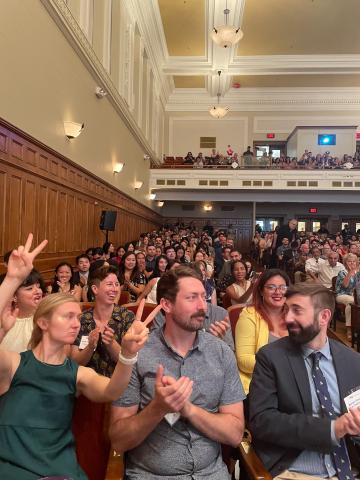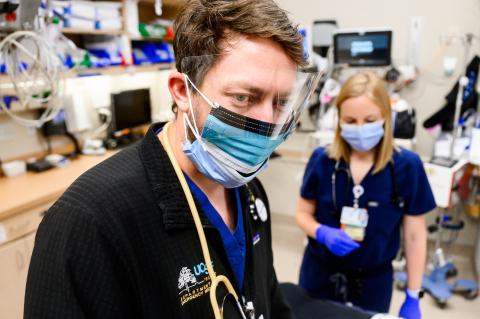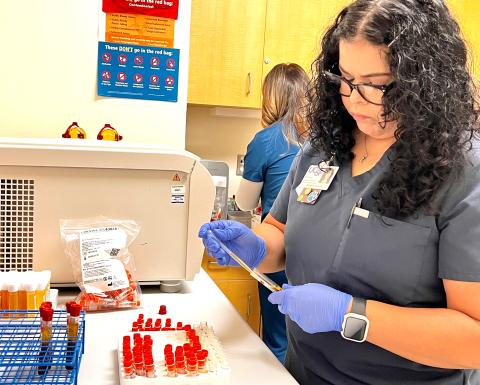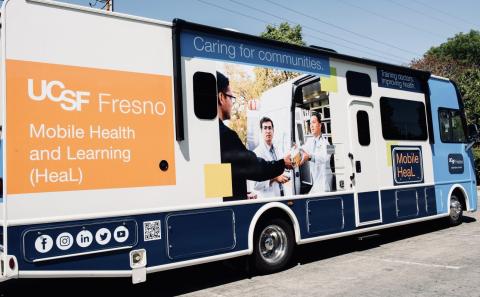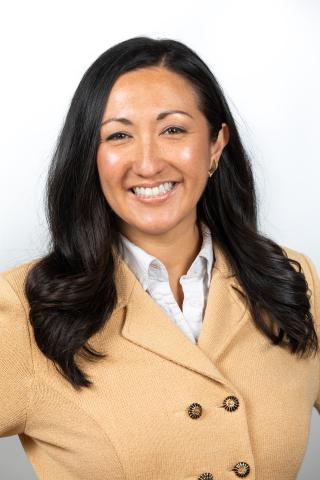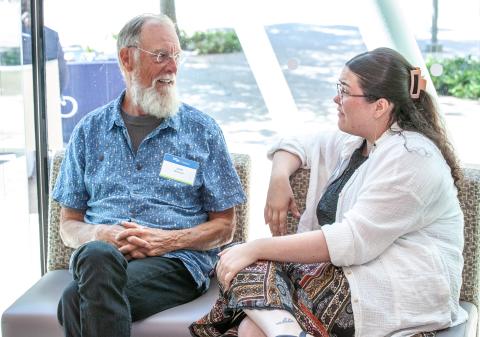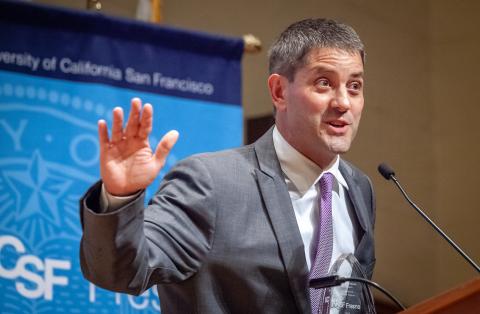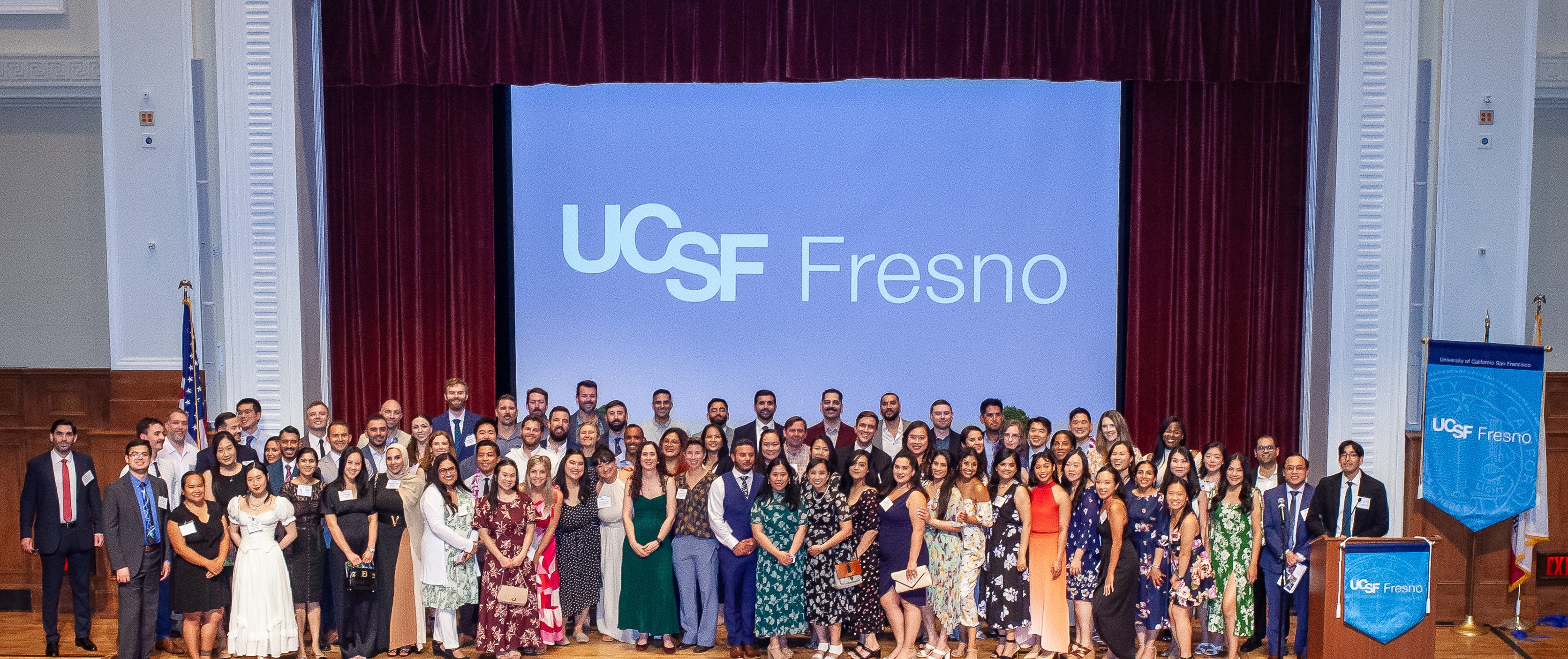
More than 100 residents in eight medical specialties, fellows in 13 sub-specialties, five Oral and Maxillofacial Surgery dental residents, and three physician assistants in a Postgraduate Training Program completed training at UCSF Fresno this year.
UCSF Fresno is succeeding at retaining physicians in California and the Central Valley through efforts to develop aspiring doctors and medical students from the region, recruiting residents from across the U.S., and retaining these physicians after they complete their training at UCSF Fresno.

UCSF Fresno graduates will continue to provide patient care, teach, or continue their medical education locally, throughout the state, and across the U.S. Seventy-two percent of the graduates are staying in California, and 44% are staying in the Central Valley.
More than 600 faculty, staff, family, friends, and graduates filled Fresno City College’s historic Old Administration Building Theater to celebrate the UCSF Fresno Class of 2024 on June 13. Graduates from the Community Medical Centers General Dentistry Residency Program also participated in the commencement ceremony.
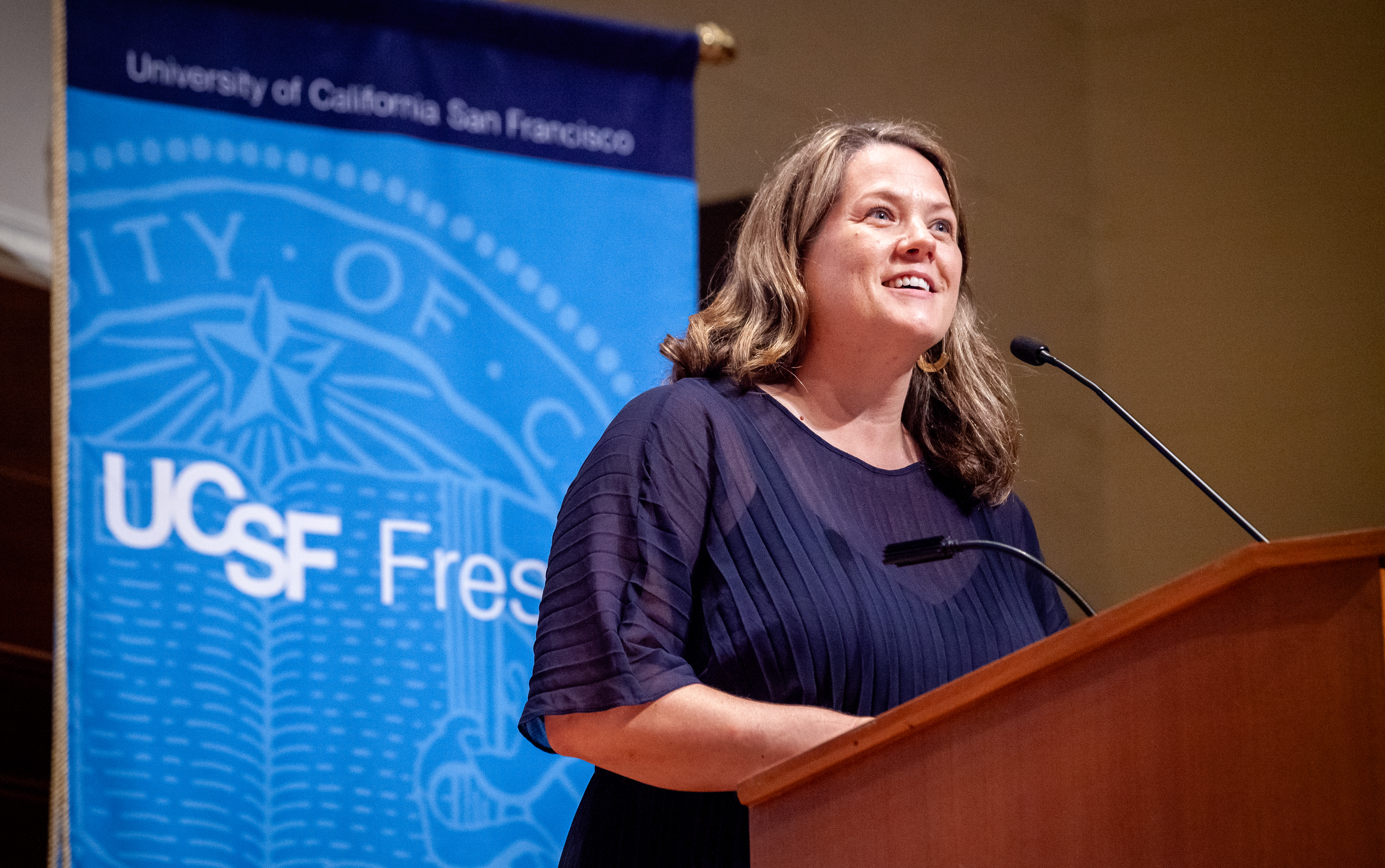
“Commencement is a joyous occasion,” said Stacy Sawtelle Vohra, MD, Interim Designated Institutional Official and Emergency Medicine Residency Program Director at UCSF Fresno. “The completion of residency training is the culmination of years of hard work and dedication devoted to the practice of medicine. It is a time for heartfelt congratulations and gratitude for the contributions of our trainees to our residency and fellowship programs and for their service to our community.”
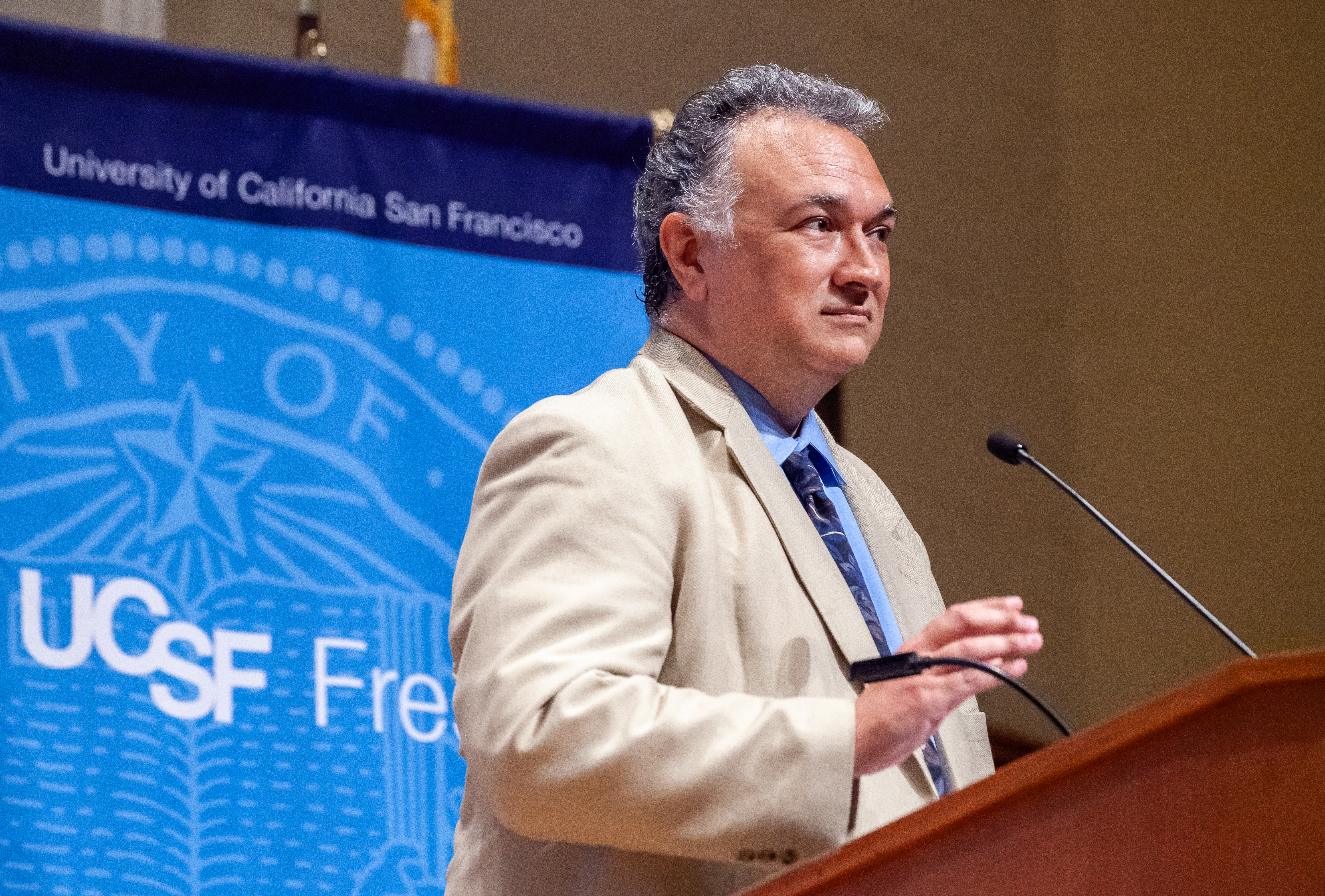
“For some of the graduates who completed medical school during the COVID-19 pandemic, this was the first time celebrating a medical education graduation in person,” said Ivan Gomez, MD, Acting Director of Clinical Affairs, and Chief of UCSF Fresno Family and Community Medicine. “We are excited to celebrate the occasion with them and look forward to the contributions they will make to the field of medicine and to improved patient outcomes thanks to the knowledge and training they received at UCSF Fresno.”
The recipient of the 2023 Kaiser Award for Excellence in Teaching, Ivance Pugoy, MD, UCSF Associate Clinical Professor of Medicine, delivered the keynote address. Dr. Pugoy shared memories and lessons learned over the past 15 years at UCSF Fresno.
He spoke of gratitude, appreciation, the genuine care and concern of faculty for UCSF Fresno learners, and learners with a passion for medicine and keen awareness of cultural diversity and sensitivity.
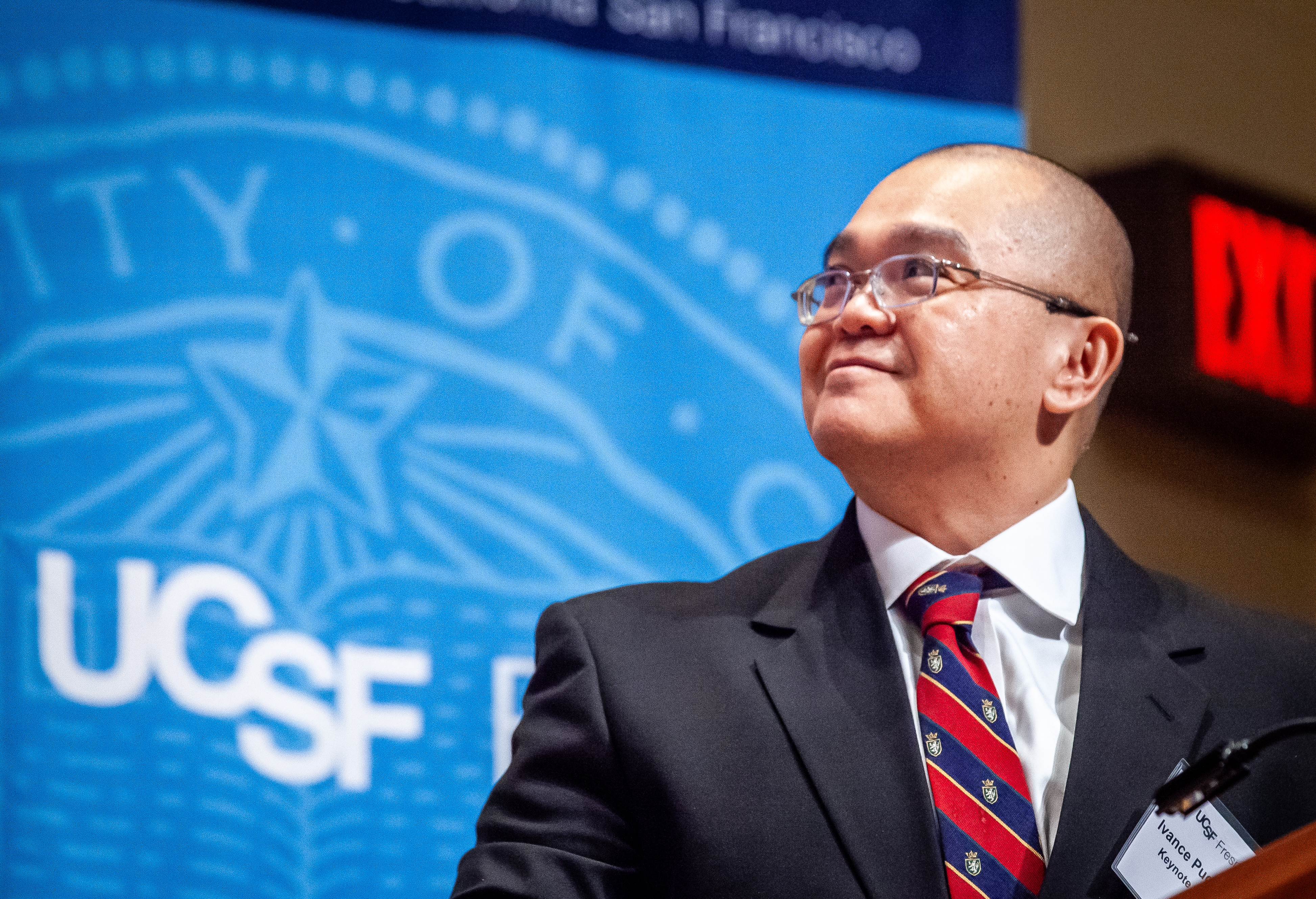
“I have encountered on many occasions when our residents used all their tools and life experiences to serve as ‘cultural brokers’ for the patients they serve,” said Dr. Pugoy.
He recalled a time when a resident persuaded a patient to have a life-saving treatment because the patient trusted his doctor who was of the same cultural background.
“I hope if there is one thing I was able to share with all of you, who have already been so successful in your lives, is that as you journey through your careers, you will gather the same collections of stories from the wonderful mentors, residents, and medical students you meet along the way,” Dr. Pugoy concluded.
As a regional campus of the UCSF School of Medicine, UCSF Fresno carries out its training and patient care through a network of affiliated partners including Community Health System, VA Central California Health Care, Family HealthCare Network, Inspire Health Medical Group (formerly Central California Medical Group and University Centers of Excellence) and many other clinical sites. For nearly 50 years, UCSF Fresno has been recruiting, training, and retaining physicians in the San Joaquin Valley. Today, UCSF Fresno is the most significant regional contributor to the physician workforce.
The shortage of physicians in the San Joaquin Valley is well documented and has a profound effect on Valley community members. Recently released information from the California Health Care Foundation’s Central Valley Health Policy Survey emphasized Valley residents’ views of the region’s health care experiences and concerns. Fifty-six percent of Central Valley residents say the region does not have enough providers and 78% are less likely to have a primary care doctor or regular health care provider than residents in other parts of the state.
Another California Health Care Foundation Survey revealed one in four Californians reported they or someone close to them has required care for serious mental illness, and one in five reported similarly for substance use issues.
UCSF Fresno Class of 2024 Highlights:
- 72% of all UCSF Fresno graduates are staying in California, 44% are staying in the Central Valley
- 100% of the graduating Psychiatry residents are staying in California; 83% are staying in Fresno
- 100% of the Family and Community Medicine graduates are staying in California; 42% are staying in the Central Valley
- 88% of the graduating Internal Medicine residents are staying in California; 58% are staying in the Valley
- 100% of the OB-GYN residents are staying in California; 50% are staying in Fresno
- Both Infectious Diseases fellows are staying to join the faculty at UCSF Fresno
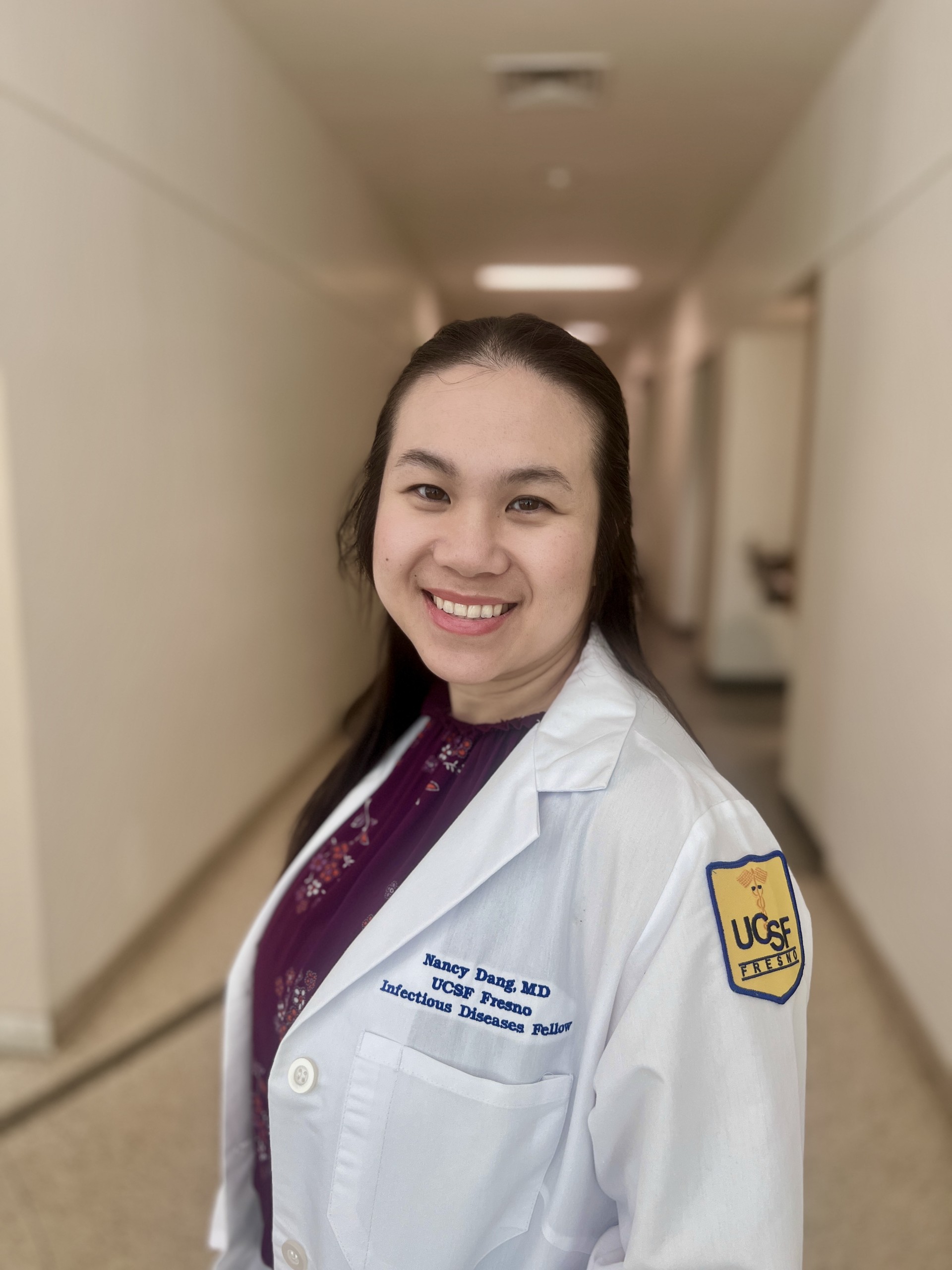
Among the graduates:
For as long as she can remember, Nancy Dang-Orita, MD, wanted to be a physician. It is a career that satisfies her longing to help others in a way that is intellectually stimulating and challenging. She is among the more than 100 residents and fellows completing training and graduating from UCSF Fresno this year. Dr. Dang-Orita is completing a two-year fellowship in Infectious Diseases (ID). Originally from Orange County in southern California, Dr. Dang-Orita is staying local to join the faculty in Infectious Diseases at UCSF Fresno, a division within the UCSF Fresno Department of Medicine.

Jessica McFarland, MD, wanted to be a doctor because her parents were physicians, and she grew up shadowing them in their clinics. Inspired by their connection to their patients and wanting to make a difference in people’s lives, the San Jose, California, native took part in medical immersion trips to Panama and Nepal during college. The experiences abroad taught her about health care disparities and confirmed her calling to pursue a career in medicine. Dr. McFarland is among the more than 100 residents and fellows graduating from UCSF Fresno this year. She is completing a two-year fellowship in Infectious Diseases (ID) and will join the faculty in Infectious Diseases at UCSF Fresno, a division within the UCSF Fresno Department of Medicine.

Enid Picart, MD, grew up interpreting for her parents during their emergency room visits. With no medical insurance and no access to primary care, the Emergency Department was their only opportunity for medical care. From SJV PRIME medical student to practicing physician, Dr. Picart fulfilled a childhood goal to care for underserved communities. She is completing a four-year residency program in Emergency Medicine at UCSF Fresno and will stay to provide care for patients in the Emergency Department at Kaiser Permanente Fresno Medical Center. She also will continue to work as a volunteer physician with Mobile Health and Learning (Mobile HeaL), UCSF Fresno’s mobile medical clinic designed to bring health care services to local communities where it is needed most while providing learning opportunities for future health care providers.
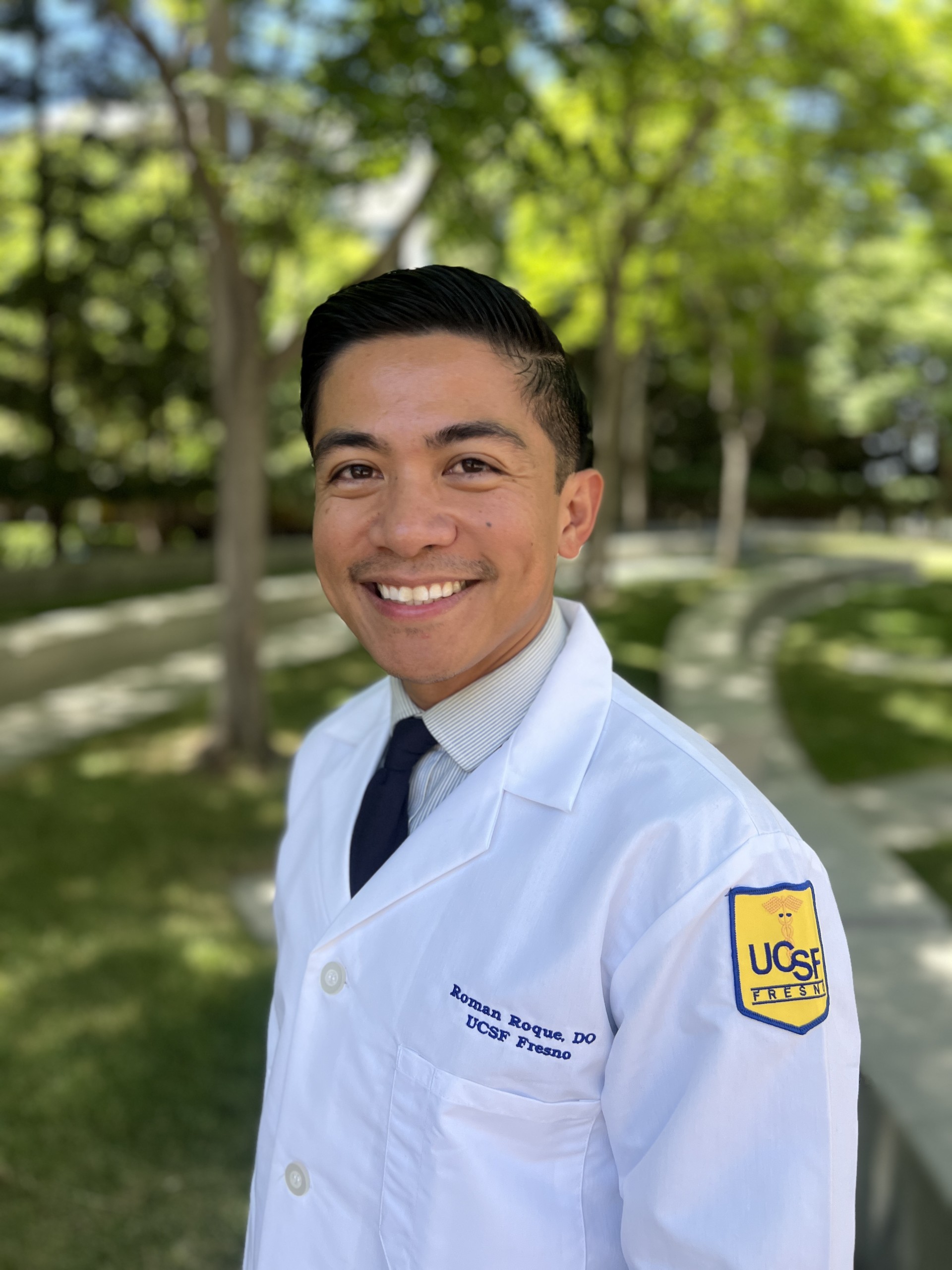
Roman Roque, DO, MPH, was born in the Philippines and moved to California’s Bay Area with his family at the age of 12. His father was a community physician in the Philippines and a maternal uncle was a physician and professor. Both were some of his earliest inspirations. Dr. Roque is among the more than 100 residents and fellows completing training and graduating from UCSF Fresno this year. He is finishing a four-year residency program in Psychiatry and after graduation, he will join the VA Central California Health Care System's Substance Use Disorders Program as a staff psychiatrist and serve as clinical faculty with the UCSF Fresno Department of Psychiatry.

Bhavi Vohra, MD, originally from Santa Clara, California, took what she calls a non-traditional path to becoming a physician. After working nearly three years in the bio-tech industry, she went back to school in search of more fulfillment. She earned a master’s in medical science, followed by a medical degree. Dr. Vohra considered becoming a pediatrician because of positive experiences as a child with her own pediatrician. However, clinical rotations during her third year in medical school solidified her future. It was then she realized she wanted to be in the operating room and to work with women. She is completing residency training in OB-GYN at UCSF Fresno. After graduation and before starting work at Kaiser, Dr. Vohra plans on expanding and growing Central Valley Bhangra, the dance studio she and her husband started in Clovis. Dancing is how they met. And now they are sharing their passion for dancing and creating a fun and supportive environment for children and adults to learn about the Punjabi culture.
Numerous awards were presented:
Jeff Thomas, MD, Chief Medical Quality Officer, Community Regional Medical Center, presented the Community Medical Centers Resident and Fellow Awards and Teaching Awards:
Outstanding First-Year Resident: Katherine Jones, DO, UCSF Fresno Internal Medicine Residency Program
Outstanding Resident Fellow Teacher: Rameen Atefi, DO, UCSF Fresno Internal Medicine Residency Program
Community Health System Teaching Excellence Award: Gregory Simpson, MD, Professor, UCSF Fresno Department of Medicine, Division of Dermatology,
Outstanding Non-Physician Teacher: Kaitlyn Loi, PharmD, BCPS, Community Regional Medical Center
Danny Davis, Senior Vice President, Chief Clinical and Operations Officer, Community Health System, presented the newly created Community Health System Research Excellence Award:
CHS Research Excellence Award, Brian Chinnock, MD, Professor, UCSF Fresno Department of Emergency Medicine
Wessel Meyer, MD, FACEP, MBChB, Associate Chief of Staff for Education, VA Central California Health Care System and UCSF Clinical Professor presented the VA ICARE Award:
VA ICARE Award: Roman Roque, DO, MPH, UCSF Fresno Psychiatry Residency Program
Nathan Thomas Maue Dreyfus, MD, Emergency Medicine Resident and Resident Council Member, presented the Leon S. Peters Resident and Fellow Awards:
Leon S. Peters Resident of the Year: Rameen Atefi, DO, UCSF Fresno Internal Medicine Residency Program
Leon S. Peters Fellow of the Year: Aseel Al-Bayati, MD, UCSF Fresno Cardiovascular Disease Fellowship
Marisol de la Vega Cardoso, Senior Vice President of Administrative Services, Family HealthCare Network, presented the newly established FHCN Excellence in Primary Care Awards:
FHCN Excellence in Primary Care Award: Justin Kamkar, DO, UCSF Fresno Family and Community Medicine Residency Program
FHCN Excellence in Primary Care Award: Keerat Singh, DO, UCSF Fresno Family and Community Medicine Residency Program
Marina Roytman, MD, UCSF Clinical Professor, Director of the UCSF Fresno Liver Program, and Immediate Past President of the Fresno Madera Medical Society presented the Steven N. Parks Leadership Award:
Steven N. Parks Leadership Award (FMMS): Jessica McFarland, MD, UCSF Fresno Infectious Diseases Fellowship
Eyad Almasri, MD, Assistant Dean for Research at UCSF Fresno presented the Borba Resident, Fellow and Faculty Research Awards:
Borba Faculty Research Award: Mohammed Fayed, MD, Associate Professor, UCSF Fresno Department of Medicine, Pulmonology
Borba Research Award: Khalid Abdullah, MD, UCSF Fresno Internal Medicine Residency Program
Borba Research Award, Bashar Tanous, MD, UCSF Fresno Internal Medicine Residency Program
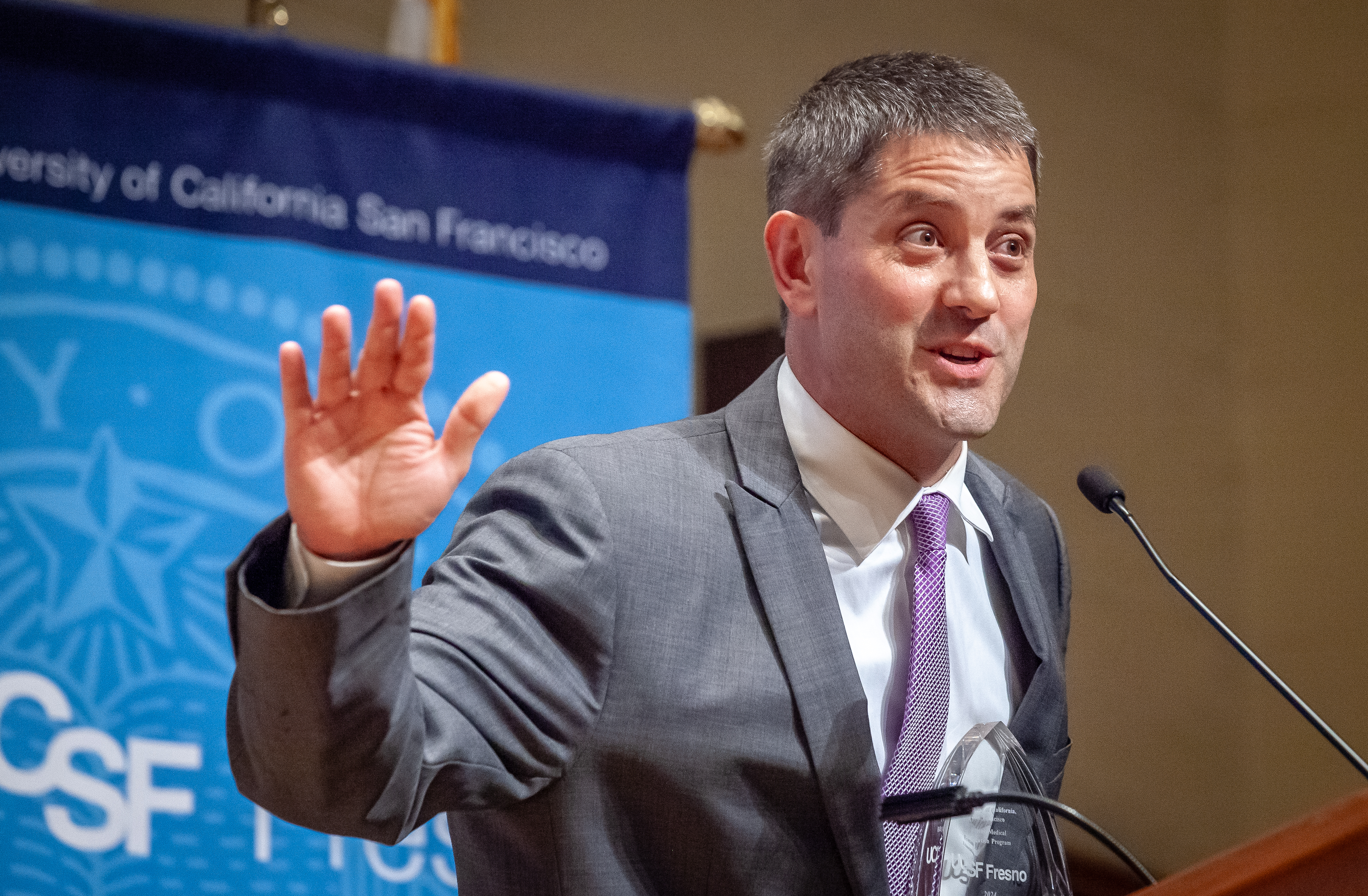
Ivan Gomez, MD, FAAFP, Interim Director, Clinical Affairs at UCSF Fresno, presented the Henry J. Kaiser Award for Excellence in Teaching:
Kaiser Award for Excellence in Teaching: Gregory Simpson, MD, Professor, UCSF Fresno Department of Medicine, Division of Dermatology
UCSF Fresno is committed to developing an outstanding physician workforce that reflects Valley communities and improves patient care and access in the region and state. By offering Valley students, medical residents and fellows with opportunities to complete their education and training in the San Joaquin Valley, we increase the likelihood they will stay here to practice where they are needed most. The goal is to recruit, train and retain highly skilled clinicians and patient advocates for the region and California.
Fifty years ago, trailblazing physicians in Fresno established an Emergency Medicine Residency Program – one of the first in the country – to train doctors to respond to medical emergencies swiftly and skillfully.
“They had the vision to start an Emergency Medicine program here, and it has made all the difference in the world for the community,” said James Comes, MD, an Emergency Medicine physician at UCSF Fresno who served as chief of the UCSF Fresno Department of Emergency Medicine (2017-2022).
The UCSF Fresno Emergency Medicine (EM) Residency Program is now one of the highest-regarded and sought-after in the country. Medical school graduates apply for 10-12 spots in the four-year residency program and train at Community Regional Medical Center (CRMC), one of California’s busiest hospital emergency departments and trauma and burn centers.
“We’re used to seeing 350 patients a day – and we’re good at that,” said Danielle Campagne, MD, an Emergency Medicine physician who completed EM residency in 2008 at UCSF Fresno and is now chief of the UCSF Fresno Department of Emergency Medicine.
About half of the UCSF faculty in the Department of Emergency Medicine at UCSF Fresno, a regional campus of the UCSF School of Medicine, received training in Fresno at some point, Dr. Campagne said.
That may be why the EM program has pioneered advancing Emergency Medicine in the San Joaquin Valley – and nationally.
Some of the innovations and accomplishments of the program:
- Leading Emergency Medicine Services (EMS) for Fresno County
- Offering a Parkmedic Program where residents can become EMS directors for nearby national parks
- Starting the fourth Wilderness Medicine Fellowship in the nation
- Conducting research that has led to new protocols adopted by EM physicians nationwide.
“Fresno has a rich heritage,” Dr. Comes said.
The EM Residency program has always been one of the busiest in California. In 1974, more than 70,000 patients a year were seen at Valley Medical Center (VMC), the old Fresno County hospital. A need for physicians propelled then-VMC Medical Director Jerry Harris and Bob Peters, MD, VMC chief of gastroenterology, to develop the residency program. They recruited Bob Dailey, MD, from the new EM Residency at USC, to start the Fresno program.
Creating an EM residency program was a radical idea in 1974. The American Medical Association had only recognized EM as a specialty in 1972. EM would not become an officially recognized specialty by the American Board of Medical Specialties until 1979.
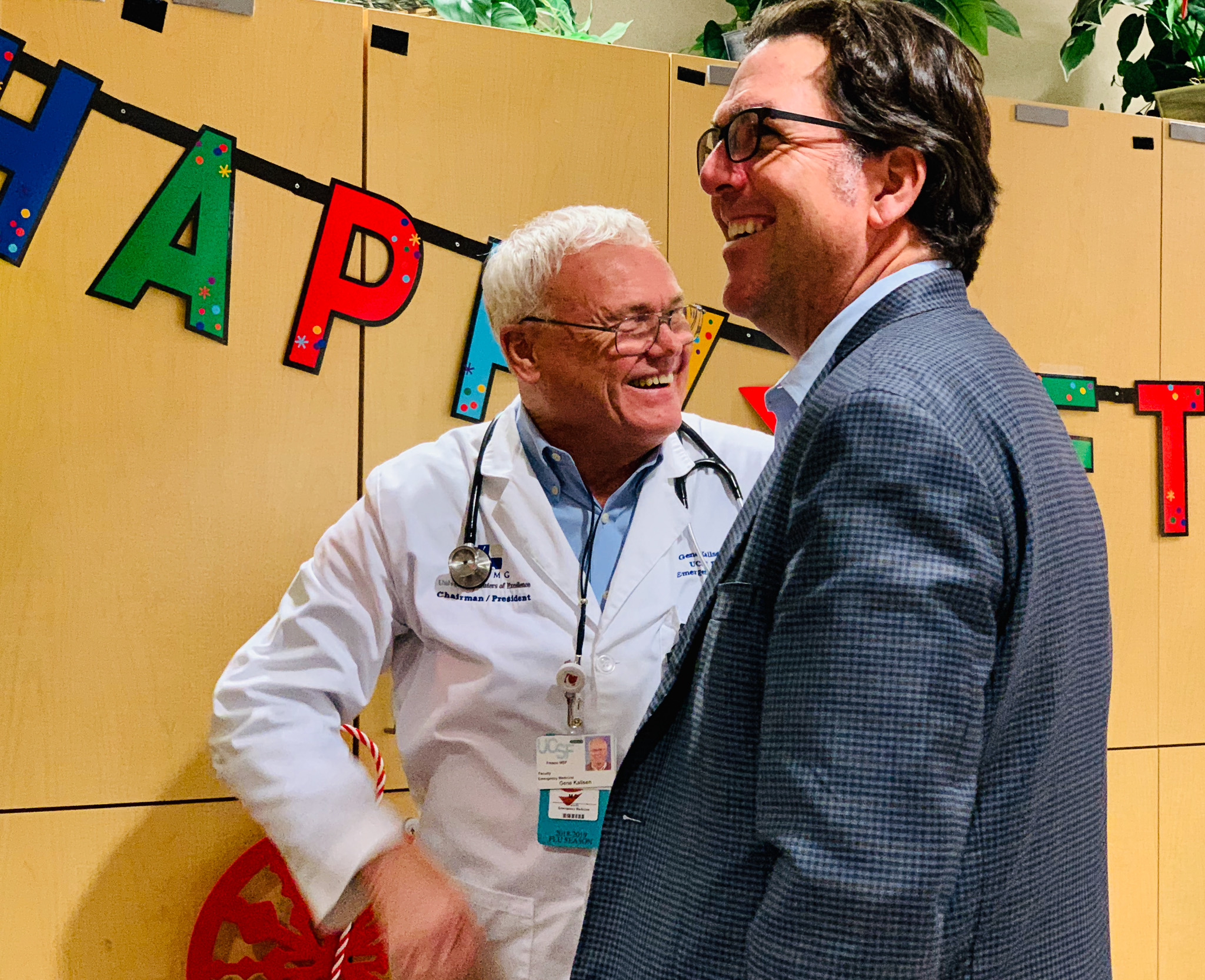
Before EM residency programs, any doctor on call – from a gynecologist to an ophthalmologist – would respond to emergencies, including heart attack, head trauma, or open wounds. Only after a “White Paper” published in the mid-1970s showed soldiers in Vietnam received better care than car accident victims in the United States did EM gain traction as a specialty.
In a 2018 interview, the late Gene Kallsen, MD, chief of the Department of Emergency Medicine at UCSF Fresno (1990-2012), recalled his hesitation in 1977 to apply to the EM Residency Program in Fresno. “It was kind of dangerous to commit your life to training in something that is not even a specialty yet and might never become one.”
Understandably, early residents in EM programs had reservations. In the early days, before 1984, faculty physicians were in the emergency department from 8 a.m. to midnight, leaving residents without an attending physician during the night shifts. “That’s just the way it was all over the United States of America. “Faculty was home,” said Herbert Bivins, MD, a Fresno EM resident from 1979-1981 who stayed to join the faculty and became residency program director in 1993. Dr. Bivins continues as a part-time faculty member at UCSF Fresno and works triage in the Emergency Department at CRMC.
The UCSF Fresno EM Residency Program today is fully staffed – and there are faculty with subspecialty expertise, such as ultrasound, research, critical care and toxicology, pediatric EM, an MD/JD, Wilderness Medicine, and Medical Education, said Dr. Campagne. “Faculty are present seven days a week, 24 hours a day. The residents are never alone, so it is a great place to train for them.”
The EM Residency Program took little time to grow and become firmly established in the community.
Within two years of its start, the Fresno EM Residency Program lengthened training from two years after a one-year rotating internship to a post-graduate PGY 2-3-year format in 1976, and in 1985, it became a PGY 2-4 program. In the 1990s, it became a PGY 1-4 program, and the rotating transitional internship closed.
“There was no doubt in our minds when we went to a four-year program that the residents were competent and confident – and ready to go anywhere,” Dr. Bivins said.
Over the years, the program has added services and fellowships, broadening its scope in the community.
For example, in 1977, the program started a Parkmedic Program that provides EM residents the unique opportunity to become EMS directors (under faculty supervision) for the EMS providers at Sequoia and Kings Canyon National Parks and, most recently, Yosemite National Park.
The UCSF Fresno Parkmedic Program has developed EMS protocols adopted nationally. Every other year, the Parkmedic Program invites park rangers from national parks throughout the United States to participate in an intense certification course (the only one in the country) to augment their skills and knowledge to function as Advanced Life Support Paramedics.
Early in the EM residency program, in 1981, Dr. Kallsen became Fresno County EMS Medical Director. Chairing the first statewide EMS organization, he helped develop EMS policies that are in use today. Fondly called the grandfather of EMS in Fresno County, he fought to reform ambulance services, resulting in faster response times. The endowed chair for the Chief of Emergency Medicine was named in Dr. Kallsen’s honor. He passed away in 2023.
The leadership of EMS in Fresno County continues in Dr. Kallsen’s tradition. Miranda Lewis, MD, who did her Emergency Medicine residency at UCSF Fresno, returned after fellowships to be faculty and now is the EMS Medical director for the Central California EMS Agency. This four-county region includes Fresno, Madera, Kings and Tulare counties.
“It’s wonderful to see UCSF faculty leading the future – and leading the past of EMS development,” said Dr. Campagne, the medical director for American Ambulance, which serves Fresno and Kings counties.
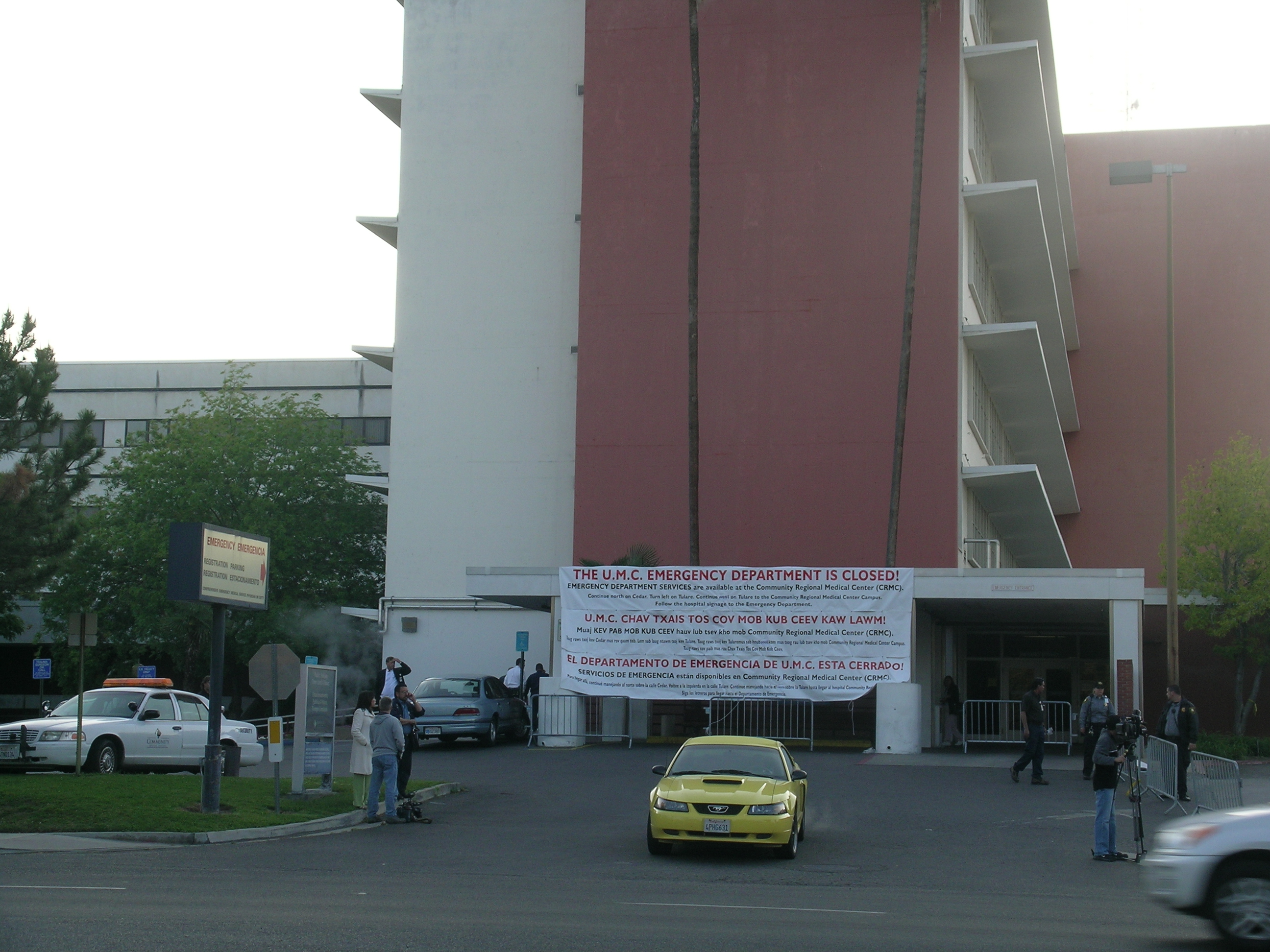
Another expansion and change in the Residency Program occurred in 2007. Growing to 10 residents per year, the UCSF faculty and residents in Fresno began covering shifts at the Emergency Department at CRMC, which opened following the closure of University Medical Center (the old VMC).
The CRMC Emergency Department and the Trauma Center care for all injured and sick patients. And this was no more evident than during the COVID-19 pandemic when physicians in the emergency department were on the frontlines. CRMC saw more COVID-19 patients than all the hospitals in San Francisco.
Dr. Comes was chief of the UCSF Fresno Department of Emergency Medicine during the brunt of the pandemic, and he said: “I am really proud of the team who I had around me for the work that we did. And I’m very proud to have been an emergency physician during a once-in-a-century pandemic.”
For Dr. Comes, there’s also a sense of pride in the breadth of emergency care provided by faculty and residents at CRMC. “This is where the poor people go; this is where you go when you are really sick and bad things are happening – you’re having a stroke or heart attack or you’ve been in a motor vehicle accident. And if you have just got a chest cold, you can walk in. This has cemented my commitment to UCSF Fresno and Community Medical Centers.”
Dr. Bivins also lauds the access to care afforded to anyone. “You walk in here, and you are going to be seen. Whoever you are – we’re going to take care of you.”
Dr. Campagne summed it up: “If you train here, you can go to work anywhere in the country because you have been exposed to so much.”
Cassandra DeWitt, MD, a Class of 2025 EM resident, grew up in Clovis and wants to work locally after completion of training. She has had family members cared for at CRMC. “Our team here has taken care of my family on more than one occasion, and I would trust them with my life and my family’s.”
When looking for EM residency programs, Dr. DeWitt said the UCSF Fresno program’s reputation stood out, and she wanted to work with the “incredibly skilled faculty.” At UCSF Fresno, she said, “You get the full breadth of training here, and that leads to really strong clinicians when you graduate.”
Over the EM Residency Program’s 50 years, several trailblazing moments stand out. Among them is the 2008 start of the Wilderness Medicine Fellowship, making it the fourth fellowship program in the United States.
The late Lori Weichenthal, MD, a resident of the UCSF Fresno EM Program from 1994-98, had the vision to start the Wilderness Fellowship. While developing the curriculum, Dr. Weichenthal was the fellowship program director in its first years. Shortly before her passing in 2023, she worked with other fellowships nationwide to create a standardized curriculum.
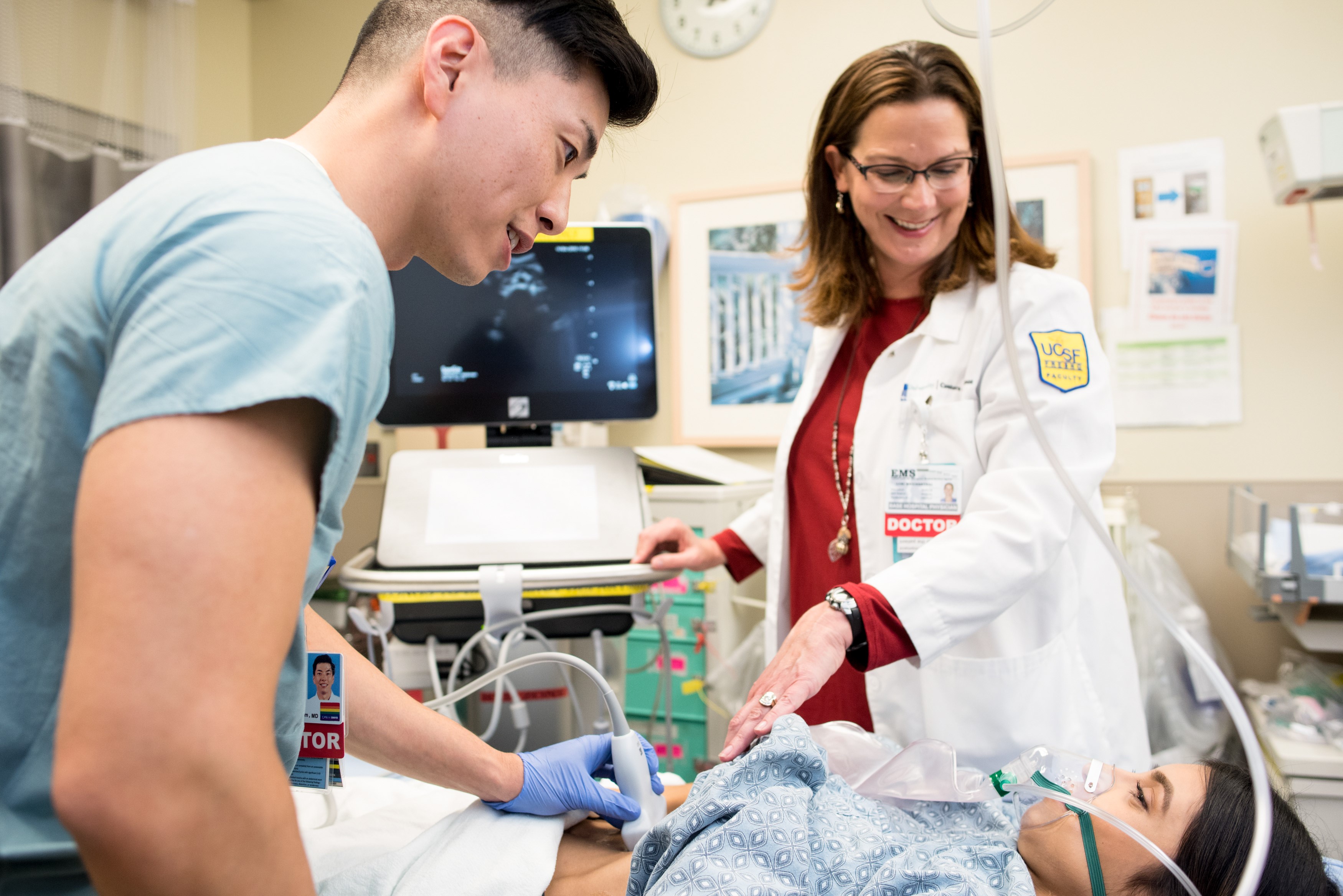
Her legacy continues today: The Wilderness Medicine Fellowship has had 17 graduates as of this year. Since 2010, Fresno County Sheriff’s Search and Rescue has had Wilderness faculty and fellows as sworn team members.
Dr. Weichenthal, a resident in the UCSF Fresno EM program (1994-1998), stayed on at UCSF Fresno to become faculty, and in 2016, Professor Weichenthal served as Assistant Dean of Graduate Medical Education (GME). In 2021, she was named Associate Dean of GME and Clinical Affairs. She also held the title of Designated Institutional Official.
The UCSF-Fresno Department of Emergency Medicine also has been active in research since its inception.
“We participated in multicenter trials that established the NEXUS clinical decision rules for C-spine radiography and abdominal CT usage, defined the safety of managing patients using bedside ultrasound for ureteral stones, and demonstrated the safety of a new black widow antivenom, said Brian Chinnock, MD, a UCSF Fresno EM physician and the EM Program research director. “And, in 10 COVID studies, we examined vaccine efficacy in U.S. health care workers, ED detection of barriers to vaccination, and many more.”
Dr. Chinnock said UCSF-Fresno faculty-initiated studies developed the "Captain Morgan" shoulder reduction technique, demonstrated that physician gestalt (historical facts and physician exam findings) was not sufficient to rule out spontaneous bacterial peritonitis (infection of abdominal fluid), and affirmed phenobarbital as a treatment for alcohol withdrawal. Faculty also did one of the earlier studies showing the efficacy of video laryngoscopy, showed irrigation was not a necessary component of abscess treatment, first tested haloperidol (an antipsychotic) as a treatment for gastroparesis (delayed gastric emptying), and showed self-swabs to be non-inferior to provider-collected swabs in gonorrhea/chlamydia detection.
Dr. Campagne said that UCSF Fresno’s EM Residency Program is the place to become a skilled clinician, develop research skills, and serve a diverse population with complex medical, social and environmental needs.
Over the years, many residents have realized it’s a wonderful place to develop as a physician, develop roots, and stay. “That’s part of our strategy to grow physicians in the Valley. If you can retain them, it just shows they got great training here and want to continue the momentum,” she said.
“So, I really thank our forefathers for creating this program because now we are continuing their greatness.”
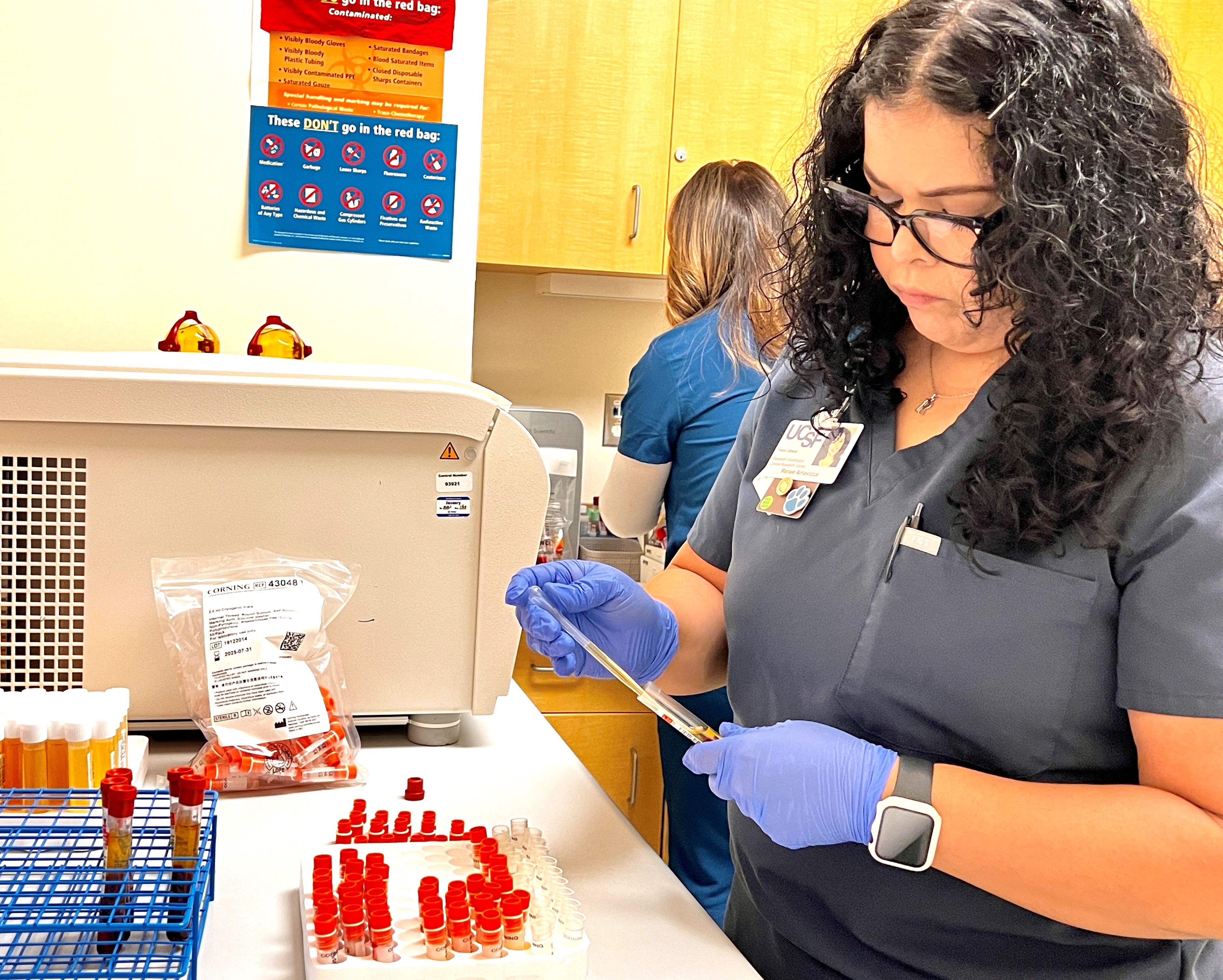
At UCSF Fresno, research is vital to the mission of improving health in Central California, and the willingness of people to participate in clinical trials is crucial to the study of medical conditions specific to the region.
Over the course of a clinical trial, faculty investigators and Clinical Research Center staff spend many hours with study participants, either at in-person visits to the UCSF Fresno research center in downtown Fresno or the occasional house-call visits and follow-up telephone calls. Trust develops, and sometimes, simply the interactions between researchers and study subjects – by themselves – lead to improved health and well-being.
At follow-up encounters, it’s common for research subjects (volunteers) to reveal health problems that are not connected to clinical trials, resulting in their getting medical attention and, in some cases, directing researchers toward a new problem to investigate.
“The more interactions they have with us, the more they trust us,” said Eyad Almasri, MD, assistant dean for research at UCSF Fresno. “Frequently, people will say they have been to a hospital or have a question for me. A lot of the time, the questions are not related to the study or even to my specialty (pulmonary/critical care) They just need someone to be their best advocate.”
Investigators do not take the place of primary care physicians, Dr. Almasri emphasized. “We’re just happy to help here.”
UCSF Fresno, a regional campus of the UCSF School of Medicine, has 47 clinical trials at various stages and several observational studies. The research provides a firsthand look at health care needs in Central California. The trials provide Central California patients with access to cutting-edge therapies for a range of conditions, including stroke, heart failure, diabetes, pneumonia, influenza, Valley fever, pulmonary hypertension, non-alcoholic fatty liver disease, cancers of the lung, blood, lymphatics, breast, and bladder, among other diseases.
Talking with study subjects can open doors to discoveries of health problems for investigation that were not on researchers’ radar. “Immersing yourself with patients and talking with people will lead to questions if you keep your eyes and ears open and take people seriously – and give them time to express themselves,” Dr. Almasri said.
Researchers have the advantage of spending time with patients, but they also have support from research staff who are bilingual in languages such as Spanish, Vietnamese, Hmong, and Arabic, among others.
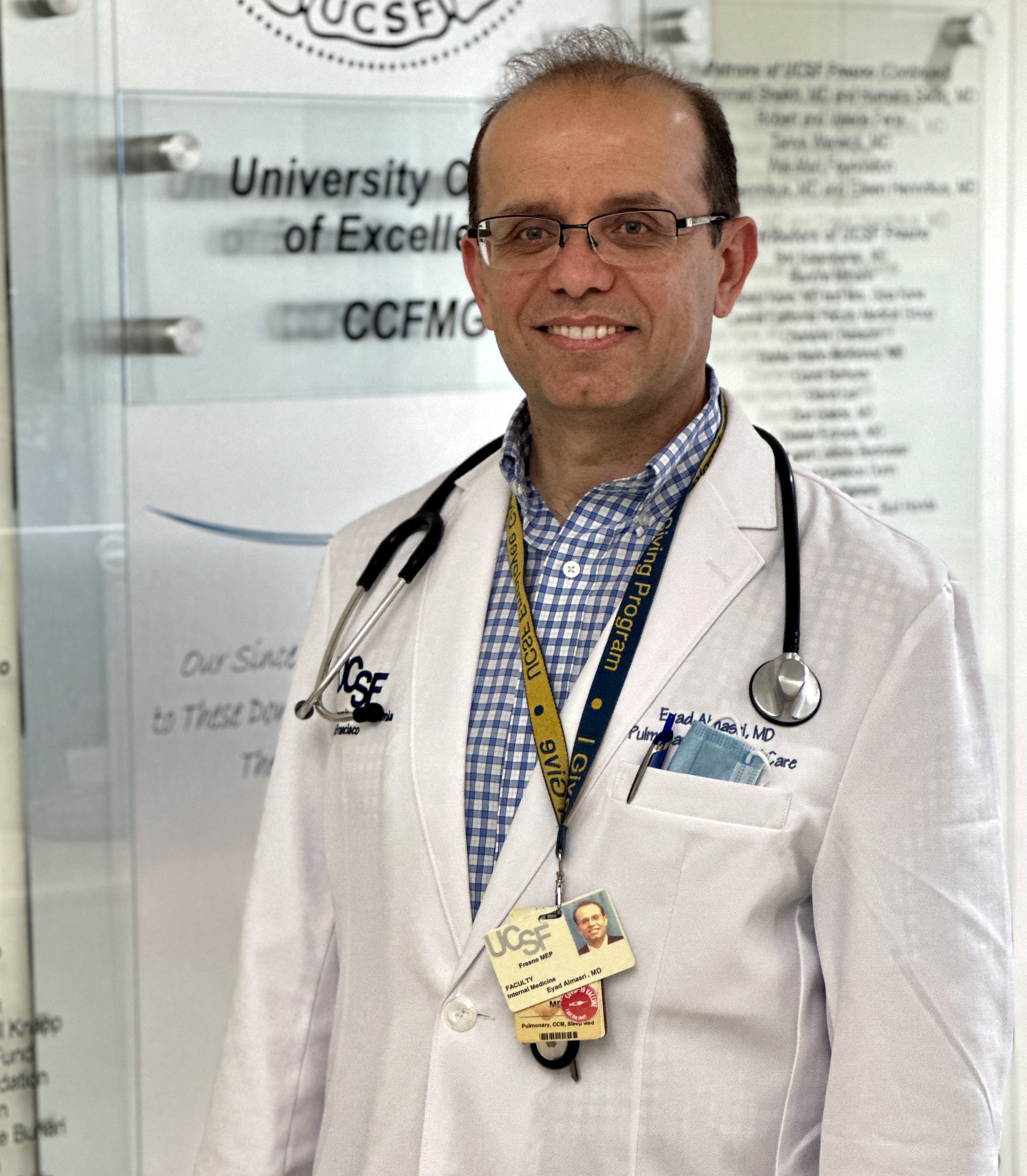
“We’re trying to make our research center representative of the community of whom we are serving,” said Dr. Almasri. “And when people see someone from their background, they tend to trust more. And not only the language, but it’s also being sensitive to the culture and the way of life and understanding their needs.”
Investigators and research staff are part of the community, Dr. Almasri added. “We’re UCSF, but we are local. I live here, my kids go to school here. We go to restaurants and grocery stores here. So, we are local.”
For more information about research at UCSF Fresno, please email: [email protected]
UCSF School of Medicine, UCSF Fresno, and Upstream USA Collaborate to Expand Access to Patient-Centered Contraceptive Care for Fresno County
Collaboration is Upstream’s first in California
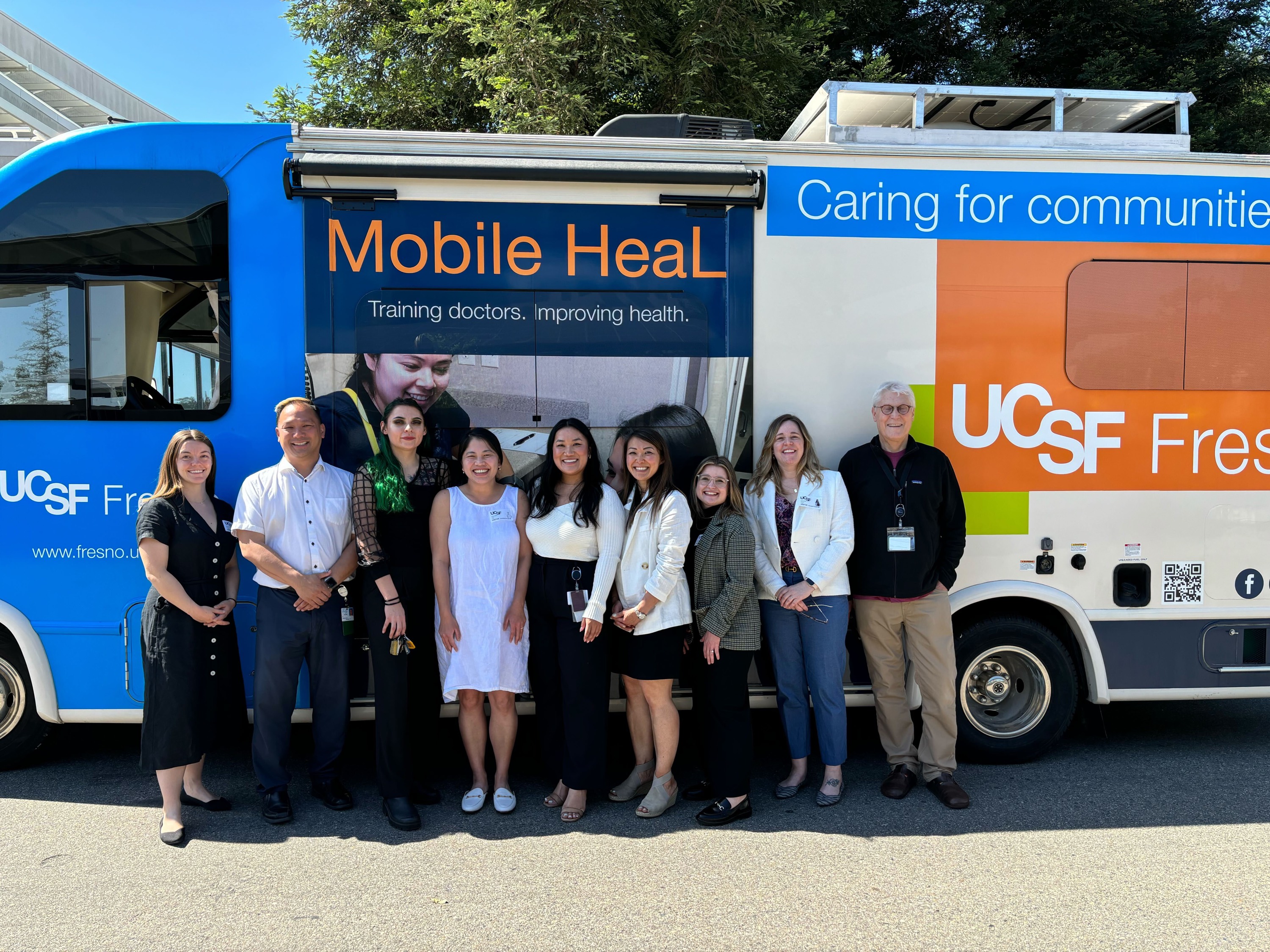
UCSF School of Medicine and its regional campus UCSF Fresno, and Upstream USA have announced a new collaboration to expand access to patient-centered, contraceptive care across Fresno County. Upstream will partner with Mobile HeaL, UCSF Fresno’s mobile medical clinic, and provide it with free training, technical assistance, and education to ensure that contraceptive services are available at no cost to every patient they serve.
In collaboration with the Fresno County Department of Public Health, City of Fresno, and community-based organizations, Mobile HeaL currently provides no-cost, basic health care services to communities across Fresno County, including agricultural workers, unsheltered individuals, and residents living in rural communities of Fresno County. Through this new partnership with Upstream and for the first time ever, Mobile HeaL will expand their services to offer contraceptive care. Mobile HeaL is entirely grant- and donation-funded. This will be Upstream’s first California partnership and the first time Upstream is working with a fully mobile clinic.
This new partnership will be celebrated later today (May 20) at a convening focused on health care workforce shortages, medical education, and access to care hosted by the United States Health and Human Services Secretary Xavier Becerra and Congressman Jim Costa (CA-21). In June of 2023, the Biden-Harris Administration also announced a public-private partnership between the U.S. Department of Health and Human Services (HHS) and Upstream to expand access to contraception across the country.

"Nobody should be denied access to the health care they need and deserve because of where they live, their income, education level, or background. Contraceptive care is basic and essential health care. I applaud UCSF and Upstream for coming together to break down barriers to ensure more equitable access to birth control,” said U.S. Health and Human Services Secretary Xavier Becerra.
The partnership between UCSF Fresno Mobile HeaL and Upstream will help address some of the most pressing health care challenges facing the county and help close critical gaps in contraceptive care. In California, more than 2.6 million women in need live in contraceptive deserts, areas in which there is no reasonable access to a health center offering the full range of contraceptive methods. Fresno County is considered a contraceptive desert, where two in five women aged 13 to 44 residing in the county lack reasonable access to contraceptive services. Although the teen birth rate in California has been declining over the past decade, the teen birth rate in Fresno County is 17.3 live births per 1,000 females aged 15 to 19, much higher than the state’s average teen birth rate of 10.3. Compared to most counties in California, Fresno also has one of the highest rates of uninsured individuals (15.7 percent).
"UCSF School of Medicine and UCSF Fresno play a critical role in training physicians, many of whom stay in the San Joaquin Valley where they are most needed, addressing the unmet health needs of Valley residents," said California Lt. Governor Eleni Kounalakis. "I applaud this important collaboration between UCSF Fresno and Upstream that will expand health care access and make a meaningful impact in our communities."

“This partnership builds on the successful track record of UCSF Fresno Mobile HeaL in expanding access and advancing health equity in our communities,” said Kenny Banh, MD, UCSF Fresno Mobile HeaL Medical Director and Assistant Dean for Undergraduate Medical Education at UCSF Fresno.
“We are more than a mobile clinic. We are a pathway for the next generation of health care leaders. Mobile HeaL provides learning opportunities for pre-health students. Through this partnership with Upstream, not only will more patients gain access to critical contraceptive services, future health care professionals will be better equipped to have these important conversations with their patients and better trained to provide patient-centered contraceptive counseling and care.” said Banh.
“Contraceptive care is basic health care that should be accessible to every person, wherever and whenever they seek their care,” said Mark Edwards, CEO of Upstream. “Yet far too often, that basic health care is overlooked, especially for our rural communities. Upstream is thrilled to work with a partner like UCSF Fresno Mobile HeaL that shares our commitment to access and equity, and is already bringing critical health services to the doors of its patients.“
“Increasing access to birth control plays a pivotal role in preventing unintended pregnancies and promoting overall wellness,” said Trinidad Solis, MD, Deputy Health Officer, Fresno County Department of Public Health. “Most Mobile HeaL patients come from marginalized communities where issues related to health insurance, housing, language, and transportation often create barriers to accessing quality medical care. The Fresno County Department of Public Health applauds this partnership and looks forward to working together to address these challenges and advance health equity in the region.”
“This partnership, supported by the U.S. Department of Health and Human Services (HHS), will expand health care to residents in the Valley who lack access to doctors to assist with family planning,” Congressman Costa said. “According to the California Health Care Foundation, 78% of Central Valley residents are less likely to have a regular doctor than residents in the rest of California. With programs like UCSF Fresno’s Mobile HeaL clinic, we can help close the gap in health care access, including contraceptive care. We must do all we can to provide quality, accessible care to the people of the Valley.”
###
About Upstream USA: Established in 2014, Upstream is a national nonprofit organization with a mission to ensure that equitable, patient-centered contraceptive care is basic healthcare. Upstream’s team of practice change experts supports healthcare organizations of all types, including hospitals, private practice groups, state and local health departments, and FQHCs, to transform the delivery of their contraceptive care so that patients have seamless access to the full range of services. Through technical assistance and training, our holistic approach increases skills and confidence for the entire health team, addresses barriers to care, and centers patients in decision-making. Upstream has partnered with 170+ healthcare organizations to improve their contraceptive services—at no cost to them. Learn more at www.upstream.org.
About UCSF Fresno: UCSF Fresno is a regional campus of the UCSF School of Medicine and UCSF, the leading institution dedicated exclusively to the health sciences. Established in 1975, UCSF Fresno is focused on improving health in California’s San Joaquin Valley through excellence in teaching and patient care, innovative clinical research and community partnerships. UCSF Fresno is the largest physician-training program between San Francisco and Sacramento in the north and Los Angeles to the south. Core and volunteer faculty at UCSF Fresno care for thousands of patients annually and train the next generation of outstanding clinicians and patient advocates at clinical partner sites. Many of the physicians trained at UCSF Fresno stay in the Central Valley to provide care, teach, or continue their education. In addition, UCSF Fresno trains medical students including students in the UCSF San Joaquin Valley Program in Medical Education and helps prepare middle, high school and college students for careers in health and medicine through pathway programs. Please visit fresno.ucsf.edu.
About UCSF: The University of California, San Francisco (UCSF) is exclusively focused on the health sciences and is dedicated to promoting health worldwide through advanced biomedical research, graduate-level education in the life sciences and health professions, and excellence in patient care. UCSF Health, which serves as UCSF’s primary academic medical center, includes top-ranked specialty hospitals and other clinical programs, and has affiliations throughout the Bay Area. UCSF also encompasses a regional campus in Fresno. Learn more at ucsf.edu.
UCSF Fresno’s success and growth are a direct result of the dedication and inspiration of our faculty, staff, residents, fellows, students, alumni, partners, donors and friends. In each issue of Focus on UCSF Fresno, we introduce you to the people who contribute to the greatness of UCSF Fresno through informal interviews.

This month, meet Summer Connery, Continuing Medical Education and Events Specialist, at the UCSF School of Medicine Fresno Regional Campus:
What is your name? Nickname?
Summer, Sum, Summy, Sum Sum, you name it!
What is your hometown? Where did you go to school? High School? Undergrad? What were your majors?
I grew up in Clovis, California, where I attended Clovis High School. After I graduated, I attended the Fresno City College Honors program before moving to San Diego with friends, where I attended California State University, San Marcos. I dabbled in Fashion Merchandising before deciding to become a Communication Major. I then moved to San Francisco where I lived for 10 years before returning to the Central Valley.
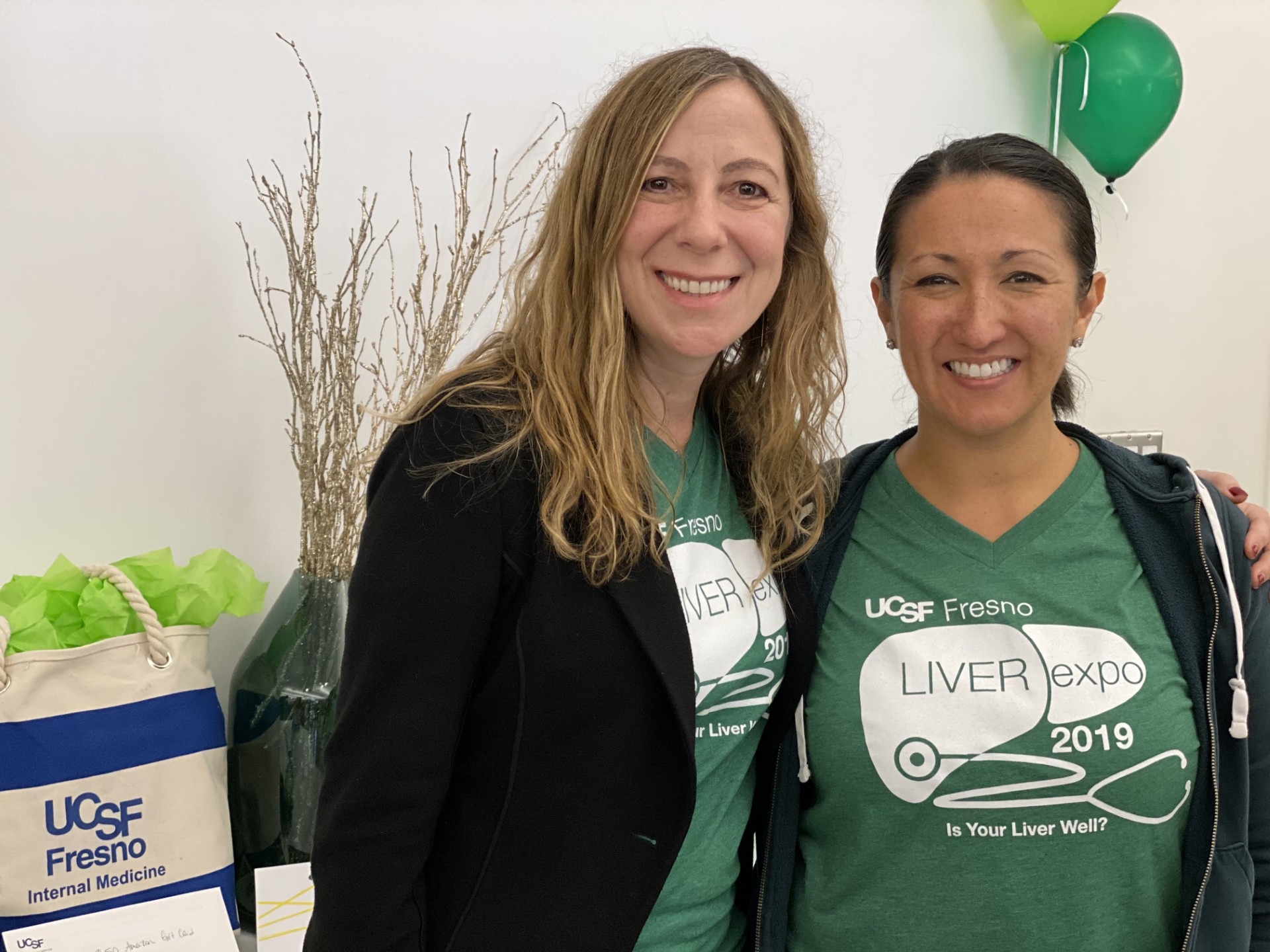
What is your title and role at UCSF Fresno? How long have you been in this role?
I have been the Continuing Medical Education Events Specialist since 2019, though my role has expanded to include community events such as the Women’s Heart Fair and Liver Expo; Office of Health Career Pathways events (e.g. Mini Med School and Reaching Out to Aspiring Doctors conferences); UCSF Fresno 101 for Public Affairs, Communications and Government Relations; and campuswide events such as commencement, and student outreach.

Why did this position and UCSF Fresno appeal to you?
My career has included many years as a social worker, and more recently, I worked in business development and education in the legal field. When I was looking to grow my career, I wanted to get back to giving back. I knew that finding an organization that was passionate about bettering communities was at the top of my list. I had my eye on a position at UCSF in San Francisco before I realized that I might be able to work for a progressive institution like UCSF while coming back to be near my family in Fresno. I was lucky enough to join the team here over 5 years ago and I have been thrilled to be a part of the mission here locally.
What are the most challenging and rewarding aspects of your job?
The most challenging aspect has been the ongoing pursuit of growth with a Continuing Medical Education (CME) program that works for our faculty and departments here in Fresno. Our program is the leader in CME in the Central Valley, and we always want to provide new and exciting content for our local physicians. Some of the most rewarding aspects of the position have involved community-based events. It feels incredible to be able to provide free access to education and preventative care for our event attendees.
What is at the top of your professional to-do list right now? What is at the top of your personal to-do list?
Professionally, I would like to continue to expand my role at UCSF Fresno to include larger projects that benefit the institution. I believe strongly in the education and experiences that we provide to our learners and would like to help UCSF Fresno grow and become more of a household name in the Central Valley. Personally, I would like to attend a culinary school in a foreign country, because a girl can dream.
The zombie apocalypse is coming. Who would you pick from UCSF Fresno to be on your team and why?
That would have to be Virginia Coningsby (UCSF Fresno Department of Emergency Medicine) because she is unbelievably organized. She would bring the good snacks from Sam's Deli, and having her there to make me laugh would make an apocalypse way more fun!
What do you like to do in your off time?
I love to cook and entertain, travel the world with my husband Andy, play with my two cats Skitters and Freja, and get outside for some hiking or camping.
What is the most important thing you would like people to know about you? Or what else would you like to add about you, your background, family, or career?
I value having fun as much as I value being taken seriously. I can be goofy, but my role and career at UCSF Fresno is something I am proud of and don't take lightly. I also think it is incredibly important to encourage others and make them feel proud of the work that they do. I am a firm believer that you can be a woo-er and a do-er.
As a regional campus of the UCSF School of Medicine, UCSF Fresno recruits and trains future physicians to address the unique health needs of the region’s diverse and underserved populations through the UCSF San Joaquin Valley Program in Medical Education (SJV PRIME). With strong connections to the Valley, SJV PRIME students call the region home and have demonstrated a commitment to serving underserved communities in the region. Students spend the first 18 months at the UCSF campus in San Francisco, then move to Fresno for the remaining two and a half years of their medical education at UCSF Fresno.

On May 7, UCSF Fresno celebrated its second annual “SJV PRIME Day” by bringing together all 49 medical students enrolled in SJV PRIME. The program’s faculty and students took part in special workshops, and meetings and retreats throughout the day. Friends and supporters of UCSF Fresno also had the opportunity to meet these exceptional students during a reception and luncheon.
John Blossom, MD, attended the event to meet the SJV PRIME student awarded the Betsy Blossom Memorial Endowed Scholarship. He was delighted to reconnect with past Blossom scholars and sit down with the 2024 Blossom Scholar Alyssa Fuentes to learn more about her commitment to becoming a physician and the impact of scholarship support on her journey in medicine.
Dr. Blossom is a UCSF faculty emeritus in Family and Community Medicine and an alumnus of the UCSF School of Medicine Class of 1970.A He completed his residency in Family Medicine at UCSF in Fresno in 1974 and joined the UCSF Fresno Department of Family and Community Medicine as faculty in 1976. Dr. Blossom served in many leadership roles at UCSF Fresno, and he created the memorial-endowed scholarship in 2020 in memory of his late wife, Martha Elizabeth (Betsy) Blossom.

Betsy grew up in the Hunter’s Point district of San Francisco, experiencing the challenges associated with a disadvantaged background. She attended Fresno City College and Fresno State and obtained bachelor’s and master’s degrees in social work. As a licensed clinical social worker, she worked at the Fresno County Department of Behavioral Health and in private practice. “Her values were always focused on women in crisis and her heart was open for the underserved,” reflected Dr. Blossom.
Establishing a new scholarship or giving to one that already exists helps the Valley’s next generation of health leaders graduate without crushing debt, leaving them free to focus on the contributions they will make to future excellence in patient care and the science of health. “I have been a part of public education my entire life,” said Dr. Blossom. “It feels good to support UCSF and meet young people who will carry out the mission of the university long after I’m gone.”
We are grateful to Dr. Blossom and other generous donors for their support, which helps ensure a world-class medical education remains accessible to the most exceptional Valley students who come from and understand the communities they one day will serve. Together, we can give SJV PRIME students the chance to graduate with minimal debt and the ability to pursue a career in academia, primary care or care for underserved communities.
To learn more about how your gift to UCSF Fresno can help us continue the important work of educating the next generation of physicians for the Valley, contact Kathleen Smith, assistant director of development, at [email protected] or (559) 499-6426.
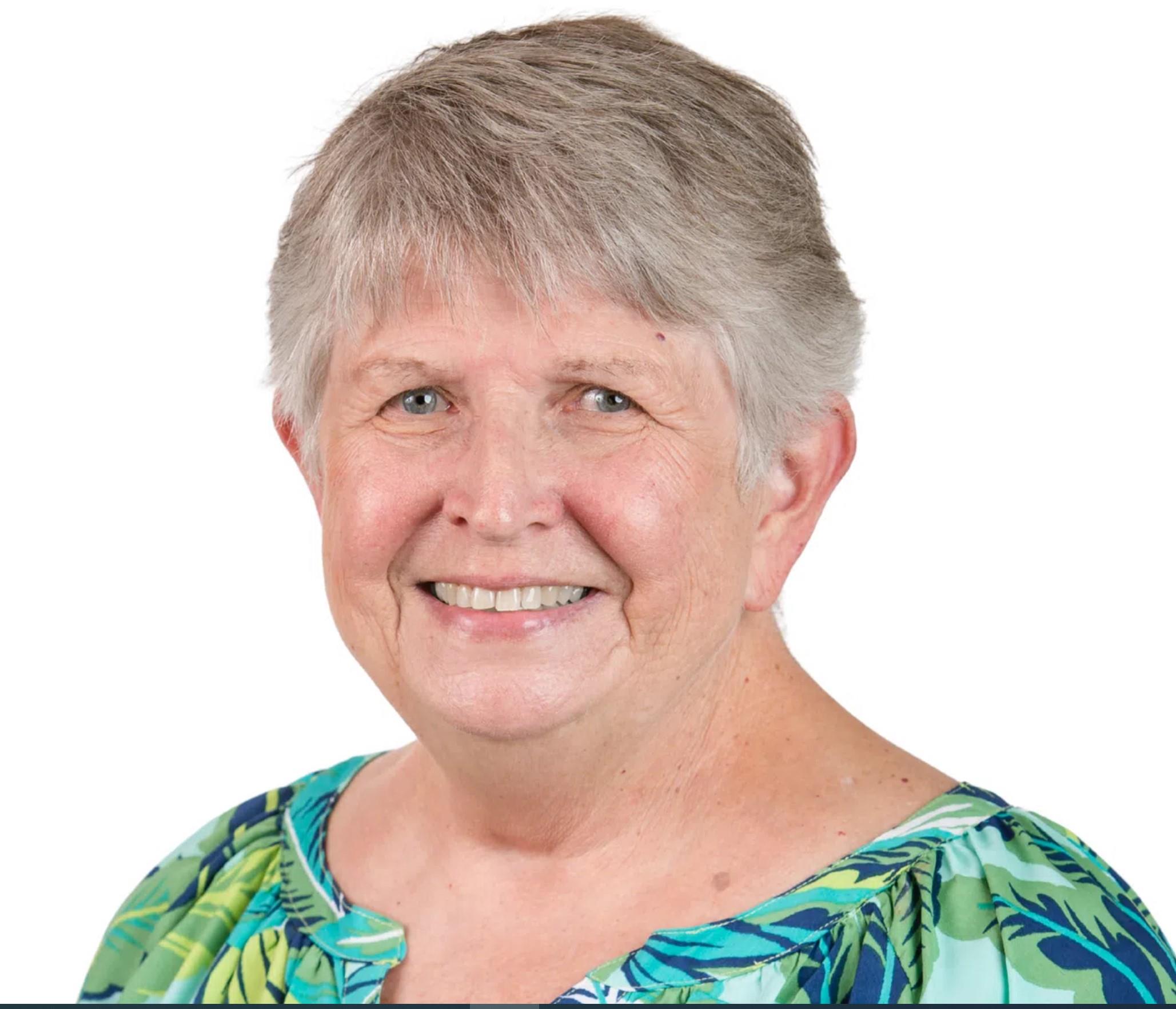
Congratulations to Christine Ann Nelson, MD, who was named interim Chief of the UCSF Fresno Department of Pediatrics. Dr. Nelson's appointment was effective July 1, 2024. Thank you to John Moua, MD, for effectively serving as Chief since May 2020 through June 30, 2024.
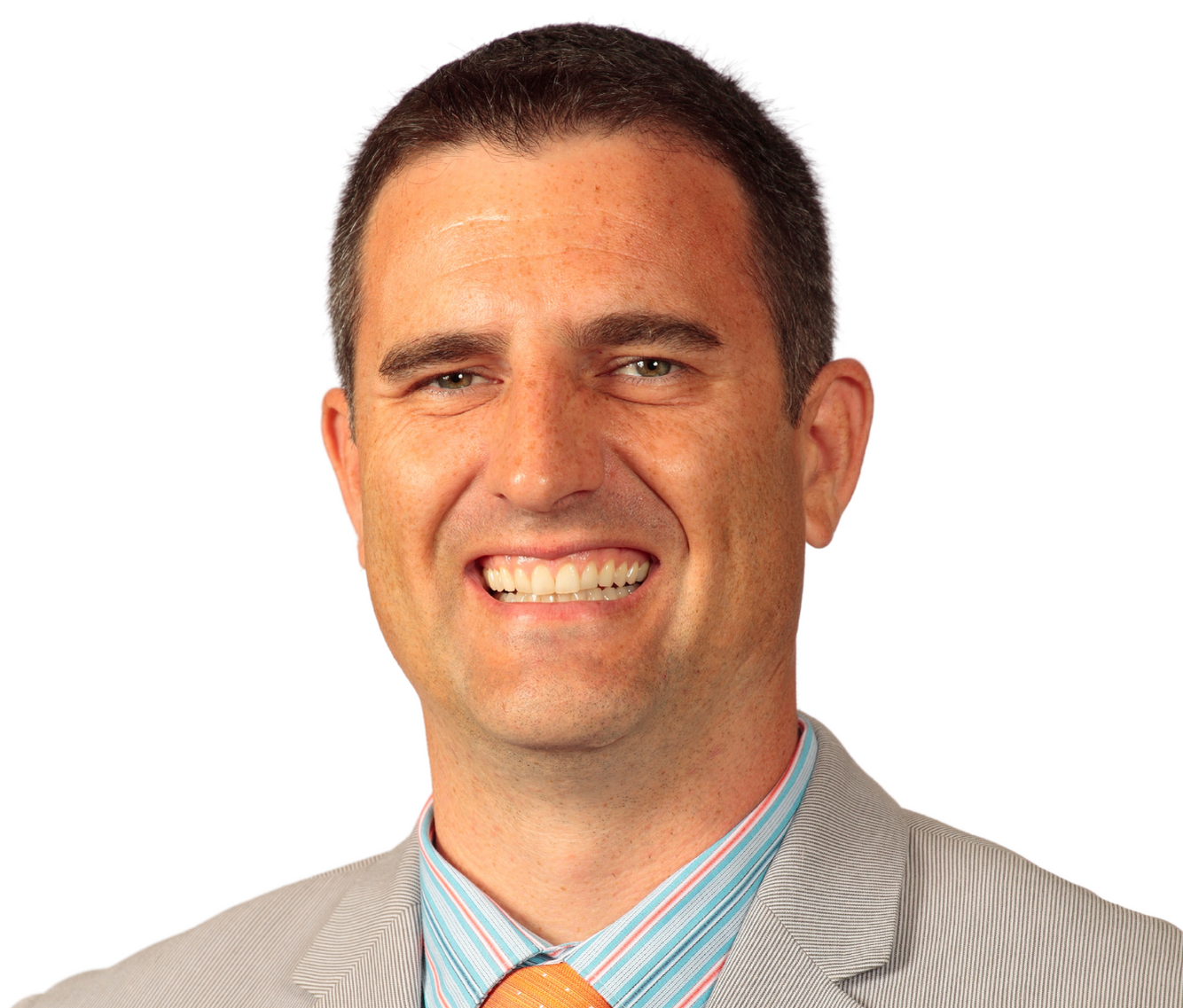
Congratulations to Christopher Downer, MD, who was named Chief of the UCSF Fresno Department of OB-GYN. Most recently, Dr. Downer served as Program Director for the UCSF Fresno OB-Gyn Residency Program since 2016. His appointment as Chief was effective July 1, 2024. Thank you to Amy (Meg) Autry, MD, for serving as interim Chief of OB-GYN since April 1, 2022. Congratulations on your retirement, Dr. Autry.
Numerous awards were presented at the UCSF Fresno Commencement on June 13. Congratulations to the graduates and award winners.

Kudos to Henry J. Kaiser Award for Excellence in Teaching recipient Gregory Simpson, MD, Professor, UCSF Fresno Department of Medicine, Division of Dermatology.
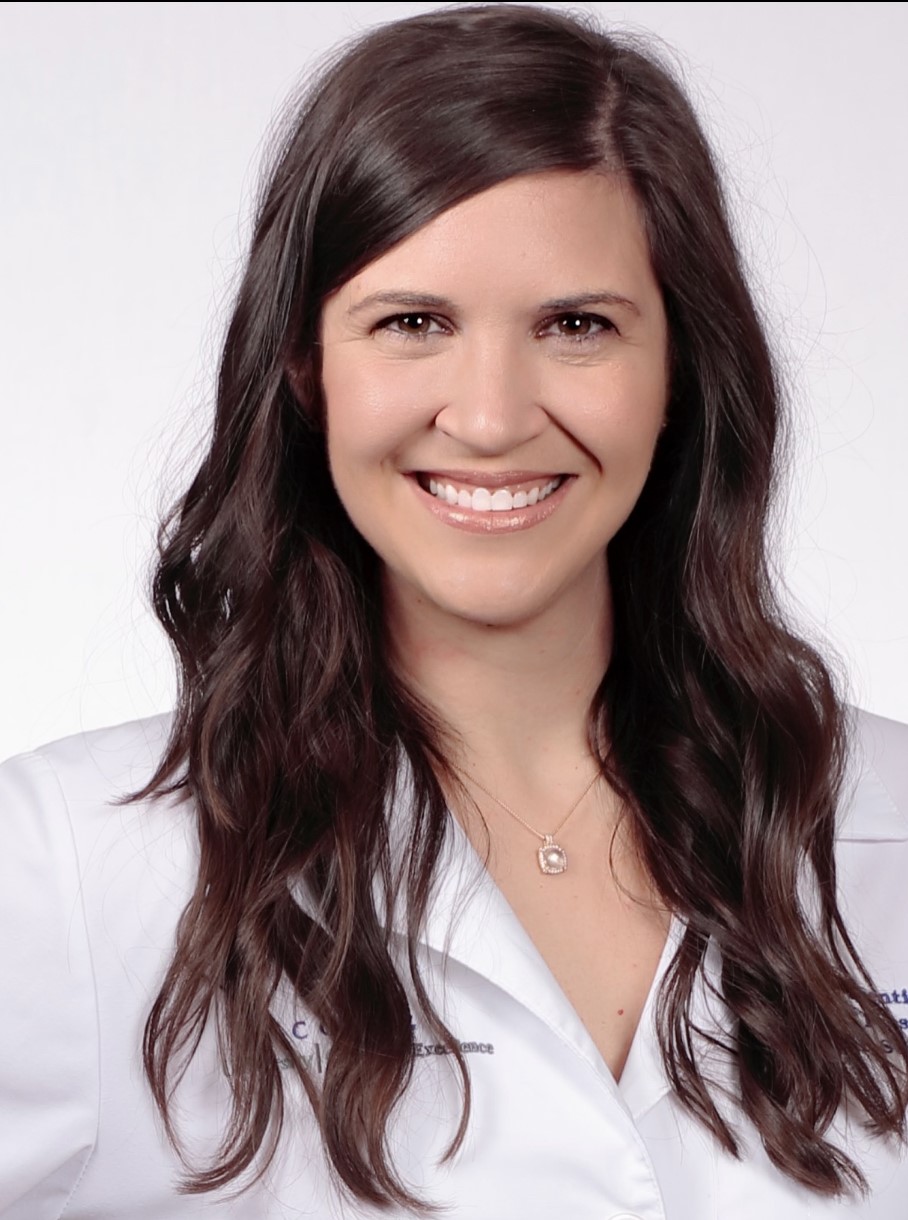
For the full list of 2024 Commencement Award winners, please see below.
Kudos to Leigh Ann O’Banion, MD, RPVI, FACS, FSVS, faculty in the UCSF Fresno Department of Surgery, for being named among America’s Best Vascular Surgeons in 2024 by Newsweek Magazine.
Congratulations to UCSF Fresno Pre-Medical Surgical Internship (PSI) Program graduate Gabriela Lopez Ruano, who was admitted to the UC San Diego School of Medicine PRIME Health Equity. As part of the five-year program, she will earn a medical degree and a master's. “Thank you all for your support along my journey! I am happy to pay forward the mentorship I have received to current and past PSI members (or any premeds you might know that need help),” Gabriela wrote in an email to Kamell Eckroth Bernard, MD, and Milena Ocon, with the UCSF Fresno Department of Surgery and Intentional Recruitment Coalition.
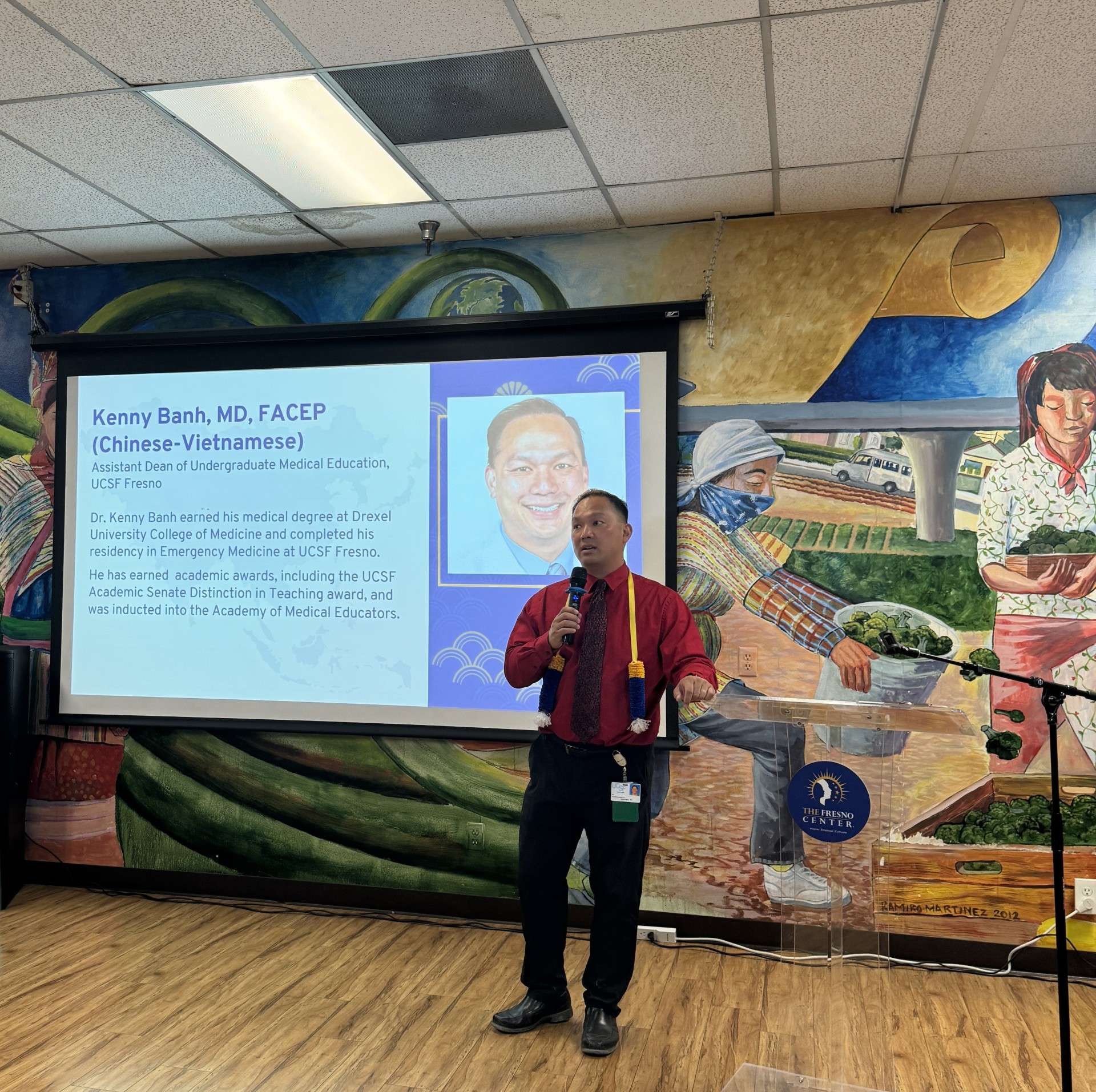
Kudos to Kenny Banh, MD, assistant dean for Undergraduate Medical Education and director of UCSF Fresno Mobile HeaL. Dr. Banh was recognized by The Fresno Center during Asian American Pacific Islander Month in May for his ongoing work with the community and students. UCSF Fresno’s Brandy Ramos Nikaido also was recognized.

Congratulations to William Dominic, MD, on his retirement. Dr. Dominic is a faculty member in the UCSF Fresno Department of Surgery and longtime director of the Leon S. Peters Burn Center at Community Regional Medical Center
Congrats to Tamiko Kido, MD, on receiving the UCSF Fresno Department of Medicine Primary Care Faculty of the Year Award in recogniton of outstanding teaching and mentoring.
Kudos to Sydney Rusconi with the Office of Health Career Pathways for earning a STAR Achievement Award in recognition of her exemplary contributions and demonstrated commitment to the Chancellor’s goals and UCSF’s PRIDE values.
Congratulations to Robyn Aguiar, MSLS, medical library professional with the UCSF Fresno Hildebrand Medical Library, on her retirement.
Kudos to Angela Allison, with the Office of Health Career Pathways, on earning a master’s in Education with an option in Curriculum and Instruction from Fresno State and for earning an Outstanding Project for “Doctors Academy Summer Experience: Program Evaluation.”
Kudos to the faculty who recently joined the Undergraduate Medical Education (UME) team:
- Tim Nguyen, MD, UCSF Fresno Department of OB-GYN/Oncology, new ASPIRE Director
- Scott Reichelderfer, MD, UCSF Fresno Department of Emergency Medicine, new Co-Director of Simulation joining current Co-Director Amy Kwok, MD, UCSF Fresno Department of Surgery/Trauma
New Ambulatory Clerkship Champions:
- Claire Gibson, MD, UCSF Fresno Department of Pediatrics
- Varsha Babu, MD, UCSF Fresno Department of Medicine/Endocrinology
- Tania Zavalza Jimenez, MD, UCSF Fresno Department of Family and Community Medicine
- Monique Atwal, MD, UCSF Fresno Department of Psychiatry
Two new Coaches joined the current coaches Lily Hitchner, MD, UCSF Fresno Department of Emergency Medicine and Leigh Ann O'Banion, MD, UCSF Fresno Department of Surgery/Vascular
- Antonio Toribio, MD, UCSF Fresno Department of Medicine/Hospitalist
- Hovig Artinian, MD, UCSF Fresno Department of Pediatrics/Pulmonology
Welcome and congrats to Jessie Werner, MD, UCSF Fresno Department of Emergency Medicine, as our new Assistant Director of Career Advising for Fresno
Thank you to all faculty who previously contributed to this work in UME including Kamell-Eckroth Bernard, MD; Jessica Fujimoto, MD; Richard Kiel, MD; and Motasem Refaat, MD.
Congratulations to the 2024 UCSF Fresno Commencement Award Winners (complete list):
Henry J. Kaiser Award for Excellence in Teaching: Gregory Simpson, MD, Professor, UCSF Fresno Department of Medicine, Division of Dermatology
House Staff Awards presented by Community Medical Centers:
Outstanding First-Year Resident: Katherine Jones, DO, UCSF Fresno Internal Medicine Residency Program
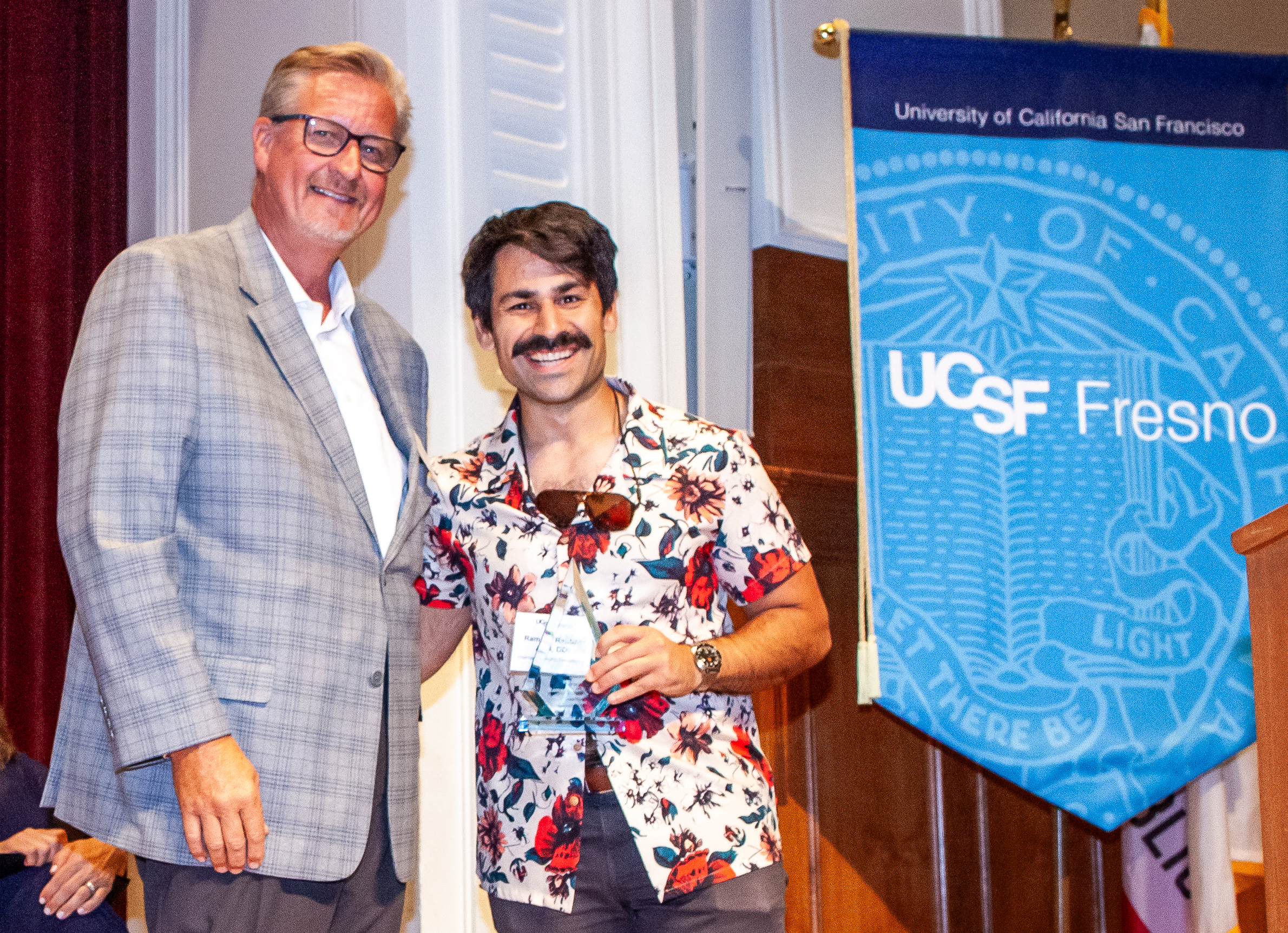
Outstanding Resident or Fellow Teacher: Rameen Atefi, DO, UCSF Fresno Internal Medicine Residency Program
Community Health System Teaching Excellence Award: Gregory Simpson, MD, Professor, UCSF Fresno Department of Medicine, Division of Dermatology,
Outstanding Non-Physician Teacher: Kaitlyn Loi, PharmD, BCPS, Community Regional Medical Center
Community Health System Research Excellence Award Brian Chinnock, MD, Professor, UCSF Fresno Department of Emergency Medicine
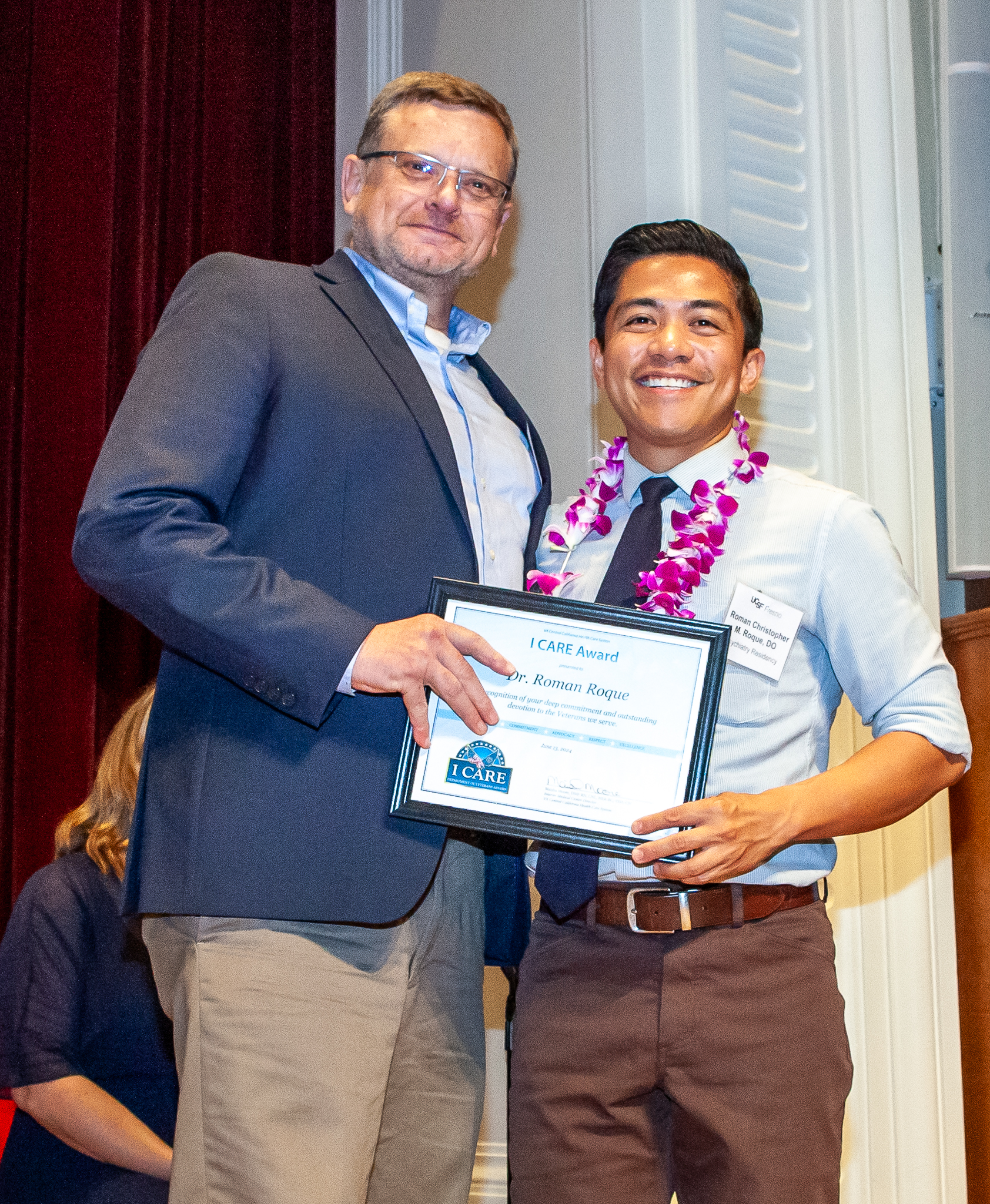
VA ICARE Award: Roman Roque, DO, MPH, UCSF Fresno Psychiatry Residency Program
Leon S. Peters Resident of the Year: Rameen Atefi, DO, UCSF Fresno Internal Medicine Residency Program
Leon S. Peters Fellow of the Year: Aseel Al-Bayati, MD, UCSF Fresno Cardiovascular Disease Fellowship
Family HealthCare Network (FHCN) Excellence in Primary Care Award: Justin Kamkar, DO, UCSF Fresno Family and Community Medicine Residency Program
FHCN Excellence in Primary Care Award: Keerat Singh, DO, UCSF Fresno Family and Community Medicine Residency Program

Steven N. Parks Leadership (Fresno Madera Medical Society): Jessica McFarland, MD, UCSF Fresno Infectious Diseases Fellowship
Borba Faculty Research Award: Mohammed Fayed, MD, Associate Professor, UCSF Fresno Department of Medicine, Pulmonology
Borba Research Award: Khalid Abdullah, MD, UCSF Fresno Internal Medicine Residency Program
Borba Research Award: Bashar Tanous, MD, UCSF Fresno Internal Medicine Residency Program

